







The
EDITORIAL


Can our national our national broadcas t er be broadcaster reformed Page 8


for millions of others is death and slavery - Page







are the ones who make the
APOSTLES: Benedict XVI on Simon and Jude Thaddeus Page 12
The crime: Syrian Orthodox priest didn’t do ‘enough’ to denounce Pope’s speech
Cleric was slain before ransom could be raised
MOSUL, Iraq (CNS) - Islamic retribution for Pope Benedict XVI’s controversial speech in Germany last month has reached a devastating climax, with an Orthodox priest decapitated.
Shockwaves were felt by Christians throughout Iraq when Fr Amer Iskender was kidnapped on October 9 and found decapitated two days later in Mosul, reportedly for not doing enough to condemn the Pope’s comments, according to local police and clerics.
Fr Iskender’s decapitated body was found on October 11 in Mosul’s Muharaibin neighborhood and his arms showed signs of torture.
The priest’s beheading follows the September 16 shooting death of an Italian nun which some have attributed as the first sign of Islamic retribution for the Pope’s comments.
But the Italian news agency ANSA reported that the Union of Islamic Courts, a fundamentalist body that controls Mogadishu, said the killing of the nun and her bodyguard was unrelated to the Pope’s comments on Islam.
A report filed by Al-Jazeera, the Qatar-based Middle Eastern news agency, said Fr Iskender was killed by Muslim captors who had demanded a ransom and a condemnation of the Pope’s remarks on Islam by the priest’s church, St. Ephrem Orthodox Church in Mosul.
However, the report said that prior to the priest’s kidnapping his church had put up signs condemning the Pope’s statement made in Regensburg, Germany, in midSeptember and calling for good
Continued - Page 12
As
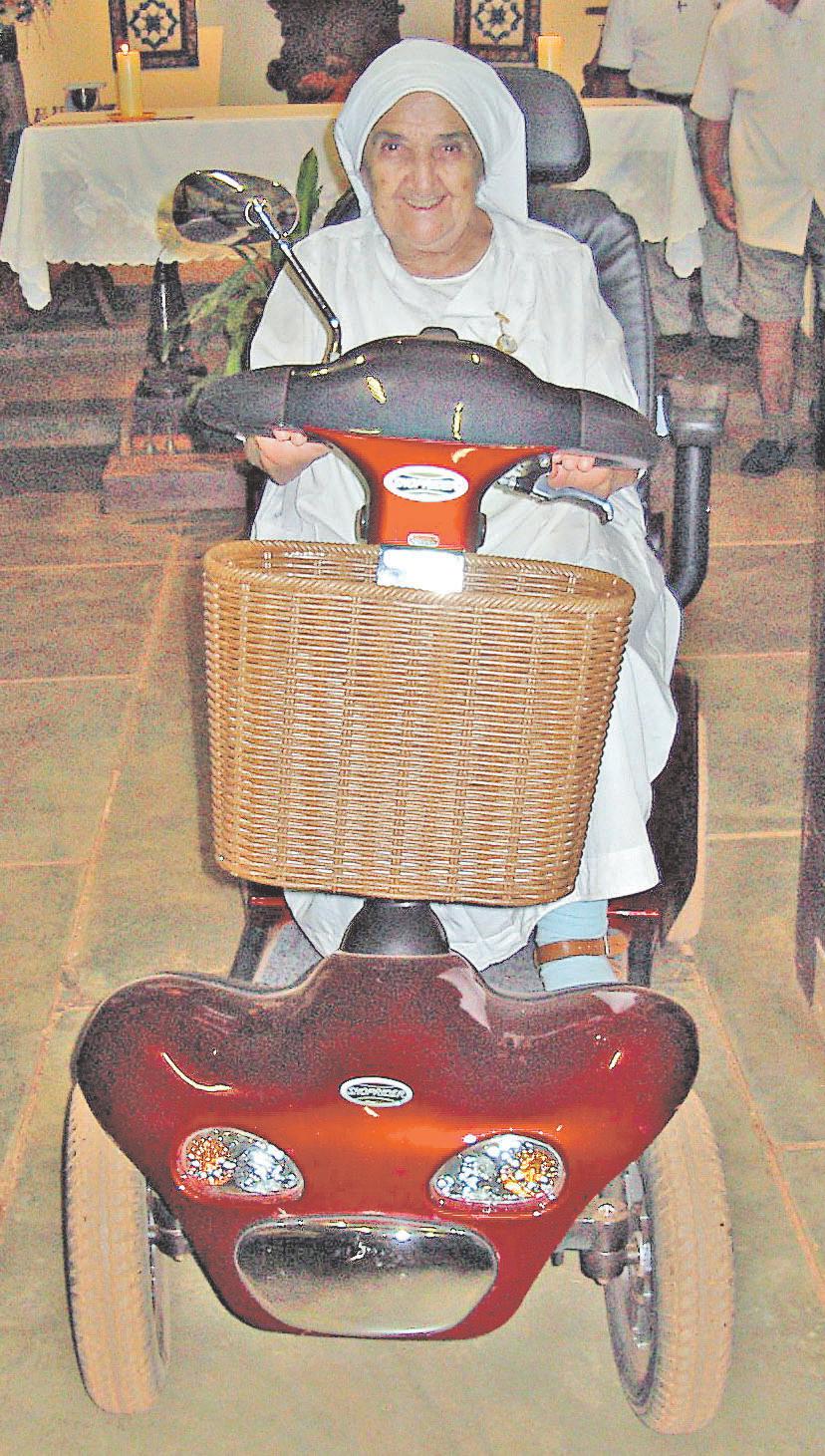
Marriage rate key to fertility: lobbyist
■ By Paul
Gray
Mr Jim Wallace, managing director of the Australian Christian Lobby, has challenged all governments to actively encourage marriage.
“A good marriage is a deep source of strength and blessing because it provides the firm commitment and security that both partners need, which in turn gives them the confidence to become parents.
“Rather than continually denigrating marriage,
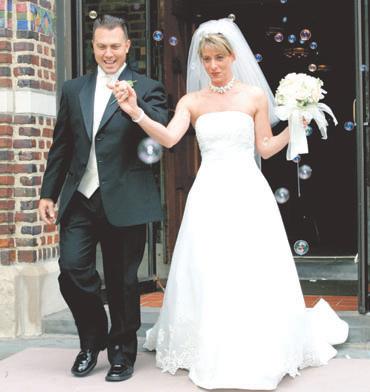
we need all Governments to actively encourage marriage.”
Continued - Page 2
Vatican seeks details of all English, Welsh dioceses
■
By Simon Caldwell
LONDON (CNS) - The Vatican has asked for the financial details of every Catholic diocese in England and Wales, months after church bureaucrats left a bishop 10.2 million pounds (US$17.8 million) in debt.
Archbishop Faustino Sainz Munoz, papal nuncio to Great Britain, has asked heads of dioceses in England and Wales for evidence to show that their accounts con-

form with canon law as well as British civil law.
In March, Bishop Patrick O’Donoghue of Lancaster, England, apologised to churchgoers after he discovered that his central administration had been “eating up” money belonging to parishes and trust funds without permission.
The Vatican’s Congregation for Clergy now wants to make sure that the scandal is not repeated, said Archbishop Sainz.
In an August 4 letter to the
Continued - Page 8
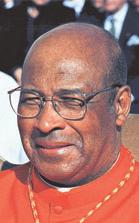
BOUNDARIES
WITHOUT
people with
contribute to the Church and society, the Church, in turn,
helping
life, and have it to the full. Page 13
October ,
Western Australia ● $2
Australia’s
disabilities continue to
is
them have
http://thecatholicrecord.org Thursday
Perth,
Western
Award-winning Catholic newspaper
Parish. The Nation. The World.
24HOUR LOVE: Beaconsfield marks adoration anniversary Page 2
INDEX Editorial/Letters - Page 8 I say, I say - Vista 4 The World - Pages 9-11 Movie Review - Page 14 Classifieds - Page 15
FRANCIS:
WINNING THE WAR Cardinal Wilfrid Napier reveals an exciting shift in the war on AIDS. But will western journalists be able to get their heads around what, for them , is a difficult concept? Page 5 www.hondanorth.com.au 432ScarboroughBchRd,OsbornePark,6017 432 Scarborough Bch Rd, Osborne Park, 6017 Ph: 94499000 9449 9000 new@ new@hondanorth.com.au DL0891 ‘DEALER OF THE YEAR’ 1996 ‘WA OVERALL EXCELLENCE’ 1996, 1998, 2003 ❙ ‘WA SALES EXCELLENCE’ 1996, 1997, 1998, 2002, 2003, 2004, 2005 FORTHEBESTDEALONANEWHONDA, FOR THE BEST DEAL ON A NEW HONDA, ACCESSORIES,PARTS,FINANCEORFROM ACCESSORIES, PARTS, FINANCE OR FROM OURRANGEOFQUALITYUSEDVEHICLES. OUR RANGE OF QUALITY USED VEHICLES.
FRIENDS OF
Balcatta secular Franciscans celebrate Page 3 WE’RE
difference - VISTA 1-3 the movies Diamonds may be a girl’s best friend... but the cost
14
Priest beheaded Mum and Dad are key Forming your child’s character helps them face life’s challenges. Parents
New set of wheels: Kalumburu’s Sr Schollie, as she is affectionately known, has put aside her well-known all-terrain four-wheel motorcycle for a sporty scooter. The new vehicle, like her old one, is Sr Scholastica’s prime means of transport around the remote Kalumburu mission. Photo: Kimberley Community Profile


Celebration: Divine Mercy College students honour Our Lady’s nativity.
Rare Marian kids lauded
■ By Sylvia Defendi
While the majority of Perth is sleeping, a handful of people pray in front of the Blessed Sacrament at Christ the King Church throughout the night.
Now in its third year, the Beaconsfield parish still manages to draw parishioners from Hamilton Hill, Spearwood, Hilton, East Fremantle, Yangebup and Palmyra 24 hours a day, seven days a week.
“This extraordinary dedication shows that there are people willing to make a major commitment to Jesus,” said parishioner Joe Migro.
Six priests and over 180 people celebrated the parish’s three years of adoration with Holy Mass on September 29. One of the celebrants, Fr Doug Harris, who founded the parish’s perpetual adoration pledge, urged parishioners, during his homily, to do more.
To date 280 people are rostered to cover each hour of the week, with another 100 attending of their own
The Record
The Parish. The Nation. The World.
EDITOR
Peter Rosengren
Letters to: cathrec@iinet.net.au
JOURNALISTS
Mark Reidy
Sylvia
Paul
accord and at least 12 managing to attend between four and seven times a week.
Despite the seemingly substantial attendance, the parish is still in need of people willing to spend an hour in adoration.
“Most people work, a large number work unconventional hours. Perpetual adoration allows these people to spend an hour with Jesus whenever it may suit their hectic schedules,” Mr Migro said.
Assistant priest at Beaconsfield parish, Fr Michael Evans, reported to his parishioners that more people have been attending parish events and engaging in church activities as a result of perpetual adoration.
According to Mr Migro, parishes are not asking enough of their parishioners.
“A small parish can not achieve perpetual adoration on its own. However, with some effective teamwork we should have many more parishes spending every hour with Jesus,” he said. For more information on perpetual adoration, or to attend adoration at Beaconsfield parish, contact Joe Migro on 9319 1169.
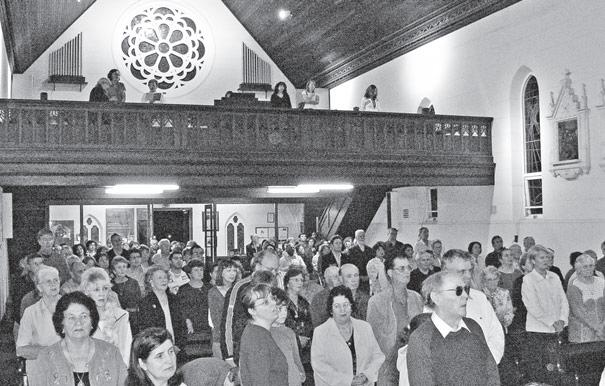


The
now operates in 130 countries with about three million active members. While a common practice in Melbourne, the college, located on Yangebup Road in Yangebup, is believed to be the only school in WA to have allowed an active Legion of Mary presidium to be installed, according to Harry Albuquerque, who is responsible for all three Spearwood presidiums.
The Legion initiated the school presidium two years ago. Out of the school’s 85 students, 15 aged seven to 14 participate in the Rosary and discussion with Legionaries each Monday during lunch time.
“The school presidium has proven very successful. Each week students are given a task to complete during the following week. These tasks encourage them to practise good habits, such as caring for parents, friends and others in the community,” said Mr Albuquerque.
The Our Lady, Mother of Divine Mercy Presidium, as it is officially called, celebrated a year of committed devotion to Our Blessed Mother, with over 40 students enjoying a small party after Mass.
For more information, contact Mr Albuquerque on: 9417 2416, or Divine Mercy College on: 9417 3267.
Marriage still worthwhile in raising children today
Continued from page 1
Mr Wallace was speaking this week after the release of information from an upcoming Fertility Society of Australia report.
The report, to be published later this month, reveals that 70 per cent of survey respondents nominated a stable relationship as their main prerequisite for having children.
Media reports said that the findings of the Fertility Society report challenge a common view that couples are putting their careers ahead of everything else.
While 70 per cent said a stable relationship was the top prerequisite for children, only 45 per cent nominated “a good income” as the main precondition.
 Jim Wallace
Jim Wallace
Less than one-third of men and women examined in the survey rated their own career as being “very relevant” to their decision whether or not to have a child.
Mr Wallace pointed out that these findings are directly relevant to debate over Federal government policies like the baby bonus, designed to increase the nation’s birthrate.
“The baby bonus has proven valuable in increasing the birthrate,” said Mr Wallace. “But 70 per cent of people clearly believe that the real need is to have the commitment in relationship that marriage
seeks before parenting children.” Mr Wallace challenged contemporary views that marriage is no longer relevant to modern society, and that it’s not necessary for the good of children.
“People intuitively recognise the importance of a stable relationship as a prerequisite for having children,” said Mr Wallace.
“Children do best when they’re raised by their father and their mother in the security of marriage. But we have to be concerned about why so many people are struggling to find the lasting love they seek and to express this commitment in marriage.”
Page 2
reidyrec@iinet.net.au
Defendi
State) sdefendi@iinet.net.au
(Parish/
Gray
cathrec@iinet.net.au Bronwen Clune (International) clune@therecord.com.au OFFICE MANAGERS inc. sales/subscriptions
Jolliffe - Accounts recaccounts@iinet.net.au
Harp - Administration administration@therecord.com.au PRODUCTION MANAGER Terence Boylen production@therecord.com.au 587 Newcastle Street, Leederville Post: PO Box 75, Leederville, WA 6902 Tel: (08) 9227 7080 October 19 2006, The Record Why not stay at STORMANSTON HOUSE 27 McLaren Sttreet, North Sydney Restful & secure accomodation operated by Sisters of Mercy, North Sydney • Situated in the heart of North Sydney and a sort distance to the city • Rooms available with ensuite facility • Continental breakfast, tea/coffee making facilities & television • Separate lounge/dining room, kitchen and laundry • Private off-street parking Contact: 0418 650 661 or email: nsstorm@tpg.com.au VISITING SYDNEY ThecompleteTravelService •Flights •Cruises •HarvestPilgrimages •HolidayTours •CarHire •TravelInsurance Dublin Paris London NewYork Tokyo Brazil Rome we do the rest! Ywedotherest! ou pack your bags, Youpackyourbags, MichaelDeering 200StGeorge’sTerrace,Perth,WA6000 POBox7221,PerthCloistersSquare,WA6850 Fax:(08)93222915 Email:admin@flightworldwww.flightworld.com.au Tel:(08)93222914 Lic.No.9TA 796 Sacrament adored 24-7 Special: Fr Michael Evans leads Mass to celebrate three years of perpetual adoration at Beaconsfield parish Crowded house: Beaconsfield parishioners flock for Mass ■ By Sylvia Defendi Independent Catholic school, Divine Mercy College is but a small cog in a massive chain that spans the globe, but its students have been congratulated on their determination and participation in the Legion of Mary on the feast of Our Lady’s nativity.
(National)
Linda
Kathi
Ireland
Legion began in 1921 in
and
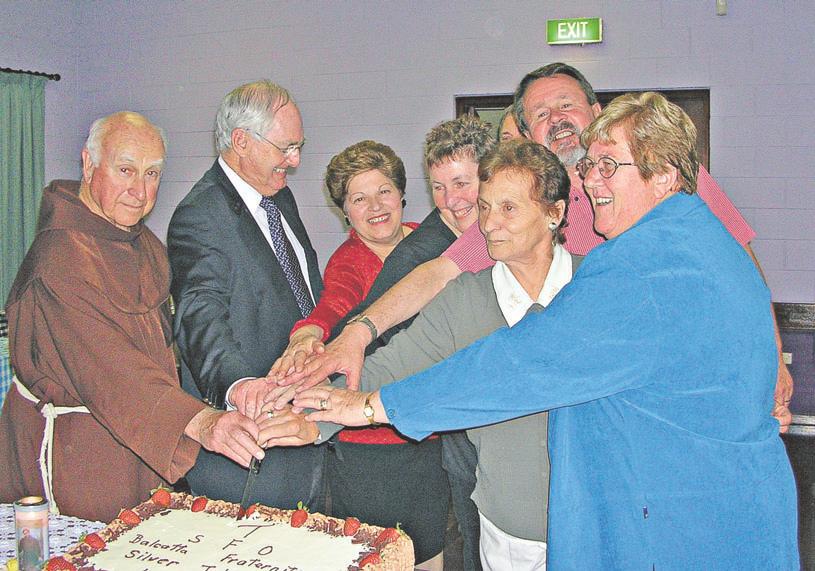
Here’s to 25 big ones
■ By Sylvia Defendi
Our Lady’s Assumption Fraternity of the Secular Franciscan Order in Balcatta celebrated their 25th anniversary on October 4 with Holy Mass and a shared meal.
The Fraternity was formed by Fr Julian Messina OFM Cap and its founding members were Jerry Donovan, Maria Sansalone, Josie Del Bene, Wendy Harvey, Julie Mendrik, Peter Meek, Pat Meek and John Calcei.
Bishop Donald Sproxton presided at the Mass, which was held at St Lawrence’s Church in Balcatta, with concelebrants Fr Michael Brown OFM, Fr Julian Messina OFM Cap, parish priest Fr Boguslaw Loska SDS and several friars.
Bishop Sproxton spoke words of encouragement to all those who attended and congratulations were bestowed upon the fraternity jubilations for preserving a faithful witness to the Franciscan way of life.
Following the Mass, a meal was shared amongst 80 Secular Franciscans, family and friends who gathered in the Parish Hall.
“The evening brought together many old friends and some faces we had missed over the years,” said formator Anne-Marie Langdon.
Several parishes make up the fraternity and over 12 members meet monthly for ongoing formation.
“The Fraternity thanks God for the blessings of the last 25 years and looks forward to sharing the Franciscan vocation for many more years to come,” Ms Langdon said.

BHP Billiton to the rescue
the heritage of both the building and the Presentation Sisters,” she said.




The
Division.
Hard to miss in its bright red corrugated iron cladding, the building was blessed recently by Bishop Justin Bianchini, Bishop of Geraldton.
BHP Billiton’s Manager of Property and Services, Kathy Stevens, said the company was proud to preserve one of the town’s most important buildings.
“This has been a very sensitive project which has sought to honour
“In doing so, the refurbishment has retained as much of the original structure and character as possible and a plaque has been erected at the front of the building to acknowledge its unique history.”
Presentation Convent School
(later known as St Cecilia’s Catholic Primary School) was established in 1942 and was kept open when Japanese bombing caused the closure of the state school.
Present at the blessing ceremony, St Cecilia’s Principal, Eileen Climo, said the refurbishment was a fitting and lasting testimony to the dedication, hard work and endurance of the Presentation Sisters in providing schooling throughout the Pilbara region.





I’m John Hughes, WA’s most trusted car dealer
Do I guarantee that when people come to do business with me, they will be treated with courtesy, sincerity, professionalism and ef ciency?
I say “I want your business and I m prepared to pay for it” and “I stand behind every car I sell”. Is that really true?
Is it true that I have over 40 technicians who are dedicated to getting my used cars in rst class condition before sale?
Is it true that every year for the last 17 consecutive years I ve been Australia s top selling Hyundai dealer?
Is it true that if somebody buys a used car from me, I will pay for a pre-purchase RAC or similar inspection?
I have a warehouse selling cars under $10,000. Is it true that I offer a full money back guarantee within one week?
On a more serious note...
A cowboy walked into a bar and ordered a whiskey. When the bartender delivered the drink, the cowboy asked, “Where is everybody?” The bartender replied, “They’ve gone to the hanging.” “Hanging? Who are they hanging?” “Brown Paper Pete,” the bartender replied.
“What kind of a name is that?” the cowboy asked. “Well,” said the bartender, “he wears a brown paper hat, brown paper shirt, brown paper trousers and brown paper shoes.”
“Weird guy,” said the cowboy. “What are they hanging him for?”
“Rustling,” said the bartender.
Page 3 October 19 2006, The Record 0 0 0 0 0 0000 0000 0000 0000
• • • • • • Just over the Causeway on Shepperton Road, Victoria Park. Phone 9415 0011 DL 6061
HUGHES Absolutely! CHOOSE YOUR DEALER BEFORE YOU CHOOSE YOUR CAR Port Hedland’s iconic Presentation House has received a new lease on life following its restoration by BHP Billiton.
JohnHughes
JOHN
restoration work has resulted in the historic former convent building of the Presentation Sisters being transformed from a derelict shell into a functional office for BHP Billiton’s Accommodation Development Projects
Monumental: Bishop Justin Bianchini reveals the plaque outside the building.
Big day: Our Lady’s Assumption Fraternity celebrates 25 years.
Rachel’s Hope spreads its arms of healing around the world
Post-abortion healing program based in US expands around world
■ By Denis Grasska
SAN DIEGO (CNS) - For 12 years, Rachel’s Hope has reached out to hundreds of women and men with its post-abortion healing and reconciliation retreats.
Though the organisation is based in San Diego, its successful retreat format has been exported to regions of Mexico, the Philippines , Australia and, most recently, Ecuador.
Now there is interest in bringing the retreat to San Francisco and Colombia.
Rosemary Benefield, a registered nurse who co-founded Rachel’s Hope with her husband, Jim, in 1994, said the growth of the program “means that God’s healing word is expanding.”
This summer Mary Ann Schwab, Project Rachel coordinator for the Archdiocese of San Francisco, visited San Diego to learn more about Rachel’s Hope. She was expected
to send a few San Francisco-area therapists to San Diego for training as Retreat leaders.
A former Retreat participant who was returning to her home in Colombia told Benefield that she would try to establish the Retreat in her country.
But this was not the first time the program had gone international.
In 2000, Benefield provided training to a religious sister wanting to promote the program in the Philippines. In 2004 the Trinitarians of Mary offered the first Rachel’s Hope Retreat in Mexico at the monastery in Tecate, after a member of the order received training from Benefield.
This year Flerida Calkins led the first Rachel’s Hope Retreat in her native Ecuador.
Whether offered in English or in Spanish, the Retreats provide opportunities for prayer, Scripture readings, a closing Mass and activities designed to bring closure to a tragic chapter in participants’ lives.
Four women, ranging in age from the mid-30s to the early 70s, participated in the Retreat in Ecuador. Calkins said the women cried as they shared their stories.
Training from the best for NFS
Four fertility experts recently gave specialised teaching to Natural Fertility Services (NFS) staff and trainees. NFS invited the four experts to come and present to staff over the course of a live in weekend from the 6-8 October.
The focus for the weekend was teaching the natural methods to couples in situations where a woman’s menstrual cycle is complex.
The presenters included Dr Amanda Lamont the founder of Fertility Care here in Perth. She
spoke to participants on the causes and treatments of infertility and subfertility.
Dr Mark McKenna, Dean of the College of Health at the University of Notre Dame, spoke to participants on menopause and peri menopause. Dr McKenna is a practicing Gynaecologist and Obstetrician.
NFS staff also learnt the Lactational Amenorrhea Method (LAM) for women post birth from Helen Barry, an expert in LAM who teaches at Mater hospital in
The women gave names to their aborted children, making it easier to pray and offer Masses for them. Other activities included writing down their feelings of guilt, presenting these accounts to the group and then burning them to symbolise God’s forgiveness. The women also wrote letters to God and their aborted children, imagining responses from each.
Although many women had registered for the Retreat, Calkins said, some found it too painful to attend, but for the four who did attend, the reaction was uniformly positive, she said.
One participant told her: “Nothing I did before has helped so much,” while another said, “A big burden has been lifted.”
Calkins plans to return to Ecuador next year to offer another Retreat and train more women as Retreat leaders.
Perth has Project Rachel Ministry which will run a healing Retreat on October 27-29 providing spiritual and therapeutic healing for men and women who have experienced abortion.
For more information contact Respect Life Office on 9375 2029.
Brisbane. Helen will be presenting a session on LAM at the Australian Council of Natural Family Planning (ACNFP) national conference this weekend (21/10) in Sydney.
Evelyn Brien, Director of Natural Fertility Services, Sydney and Chair of the Teacher Training Committee for ACNFP presented sessions on psychosocial factors affecting fertility, how a woman’s cycle is affected following the use of hormonal contraception, and chart interpretation in various situations.

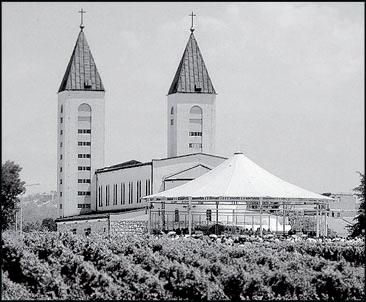



Networking God
■ By Sylvia Defendi
The Church, like any other institution, needs to manage resources and work in unity for a common goal. This is the thinking behind a new seminar headed for Perth.
With the concept of Jesus as the ultimate ‘networker’, Caritas Australia, The Catholic Social Justice Council of WA, Centrecare, The Council for Australian Catholic Women and The Knights of the Southern Cross have all banded together in an effort to increase the networking power of the Church.
Laity, religious and clergy are invited to hear Ron Gibson, Australia’s foremost authority in the field of networking, speak at an effective networking seminar at Highgate parish’s Pastoral Centre on October 24 at 7pm.
At $5 a ticket, the seminar will address issues of effective communication, enlisting support, building relationships and creating opportunities – no matter what the situation.
Spokesperson for the Council for Australian Catholic Women, Michelle Wood, said the seminar would provide a unique opportunity for the Church to build supporters and reciprocal partnerships between individuals and organisations with similar interests.
“Networking teaches us to look for connections and create opportunities with those outside our immediate interests and domains,” Ms Wood said.
Stating that this will ideally be the beginning of developmental programs within the Church, Ms Wood added “The world is the reason the Church exists, and networking facilitates our engaging the world, which is an important part of the evangelization process.”
A member of the Future Parishes Committee, Ms Wood believes that the seminar will help individuals and parishes grow beyond themselves for the sake of the Church’s global mission.
To register your interest, or for more information call: 9422 7900, or email: reception2@highgateperthcatholic.org.au.
Pope set to talk Turkey
■ By John Thavis
VATICAN CITY (CNS) - The Vatican officially confirmed that Pope Benedict XVI will travel to Turkey at the end of November, despite misgivings among many Muslims over recent papal remarks on Islam.
The Pope’s November 28December 1 trip, his first to a predominantly Muslim country, will include stops in Ankara, Ephesus and Istanbul, the Vatican said.
The Pope will travel at the invitation of the Turkish government and the Orthodox Church’s Ecumenical Patriarchate of Constantinople.
In Ankara, the capital, he is expected to kick off his tour by meeting with political leaders on November 28, then the following day will say Mass in Ephesus, an important early centre of Christianity in western Turkey.
The Pope will meet with Ecumenical Patriarch Bartholomew in Istanbul in the evening of November 29 and participate in an Orthodox liturgy the next day.
On December 1 he is expected to celebrate Mass for Catholics in the city before returning to Rome.
In September, he gave a speech in Regensburg, Germany, which caused widespread indignation among Muslims, particularly in Turkey, where some suggested the papal trip be cancelled.
Since then, on several occasions the Pope has expressed his regret at the offence taken by Muslims and distanced himself from the critical comments he quoted.
Many Muslim leaders have welcomed the papal statements, while others have asked for a fuller apology.
The day before the Vatican confirmed the trip to Turkey, 38 Islamic scholars published an open letter to the Pope, pointing out what they considered mistakes and oversimplifications in his speech but condemning any violent reaction.
Among those signing the letter was the grand mufti of Istanbul, Mustafa Cagrici.
The visit to Turkey will be Pope Benedict’s fifth foreign trip since his election in April 2005.
Page 4 October 19 2006, The Record 2007 PILGRIMAGES early-bird specials HARVEST PILGRIMAGES FREE CALL 1800 819 156 All prices listed do not include taxes Why not extend your pilgrimage to: frankfurt (1) sea of galilee (3) jerusalem (5) departing 16 february medjugorje pilgrimage frankfurt (1) medjugorje (7) departing 27 february From $2695 rome and medjugorje rome (3) medjugorje (7) departing 25 february From $3290 From $3890 Rome (3) $795 Rome & Medjugorje (7) $1495 *Includes flight extensions holy land pilgrimage Flightworld Travel Perth : (08) 9322 2914 Travelscene Lords : (08) 9443 6266
Guru: Ausrtralia’s networking expert Ron Gibson.
Cardinal shoots down argument in flames
The cool and collected Archbishop of Durban has a compelling argument for defending the Church’s stance on condoms
Cardinal Wilfrid Fox Napier can look you in the eye for a long time. He seems to break his gaze only when laughing, whereupon he tilts his large face upwards, heaves his shoulders and lets out a deep, fruity chuckle.
The Archbishop of Durban’s considerable frame and dignified manner could be imposing; in fact, though, he exudes warmth and friendliness. He speaks with a thin South African accent in a voice which has a mellow, soothing quality that makes tough words sound kind. But the key to his character is his absolute integrity. He refuses to budge from the truth, even if it is uncomfortable.
For example, when discussing the Muslim uproar over Pope Benedict’s use of an anti-Islamic quotation from a 14th century Byzantine emperor last month, Cardinal Napier disdains to appease Islamic sensibilities. “The violence of the reaction perhaps justified what this emperor said in the 14th century,” he said. “It shows that perhaps he wasn’t far off the mark.” The cardinal does not make such statements to antagonise Muslims.
He does, however, have profound concerns about the tensions between Islam and Christianity, particularly in Africa. “In Durban we had quite a long negative experience of Islam from a group called the Islamic Propagation Centre,” he explains. “Not so much now because the leader was taken ill and has died since, but he was a ferocious opponent, an enemy I could almost say, of Christianity and Catholicism in particular.
“So we are quite used to those sorts of attacks. “It’s very difficult to deal with people who feel that the truth is their property and only they can determine what truth is.” The cardinal looks to Senegal, a country in which Christians and Muslims seem able to live together without killing each other, as a “good

model” of interfaith relations. “That has taken a lot of hard work on both sides,” he says. “But in other countries, such as Nigeria, there is open conflict.” He suggests that Benedict XVI’s Regensburg address was in part a response to the last consistory of bishops in Rome, when several African prelates conveyed their distress about the rise of violent Islamism.
“If I understand him well, Benedict is a fantastic listener and that is why he wanted to put across the concerns of our bishops about relations with Islam.” Yet the greatest crisis facing South Africa is not the rise of radical Islam, but the appalling spread of AIDS. At the beginning of this year, according to the international AIDS charity Avert, five and a half million people were living with HIV in South Africa, with almost 1,000 AIDS victims dying every day.
The disastrous situation usually prompts the liberal establishment into issuing a knee jerk condemnation of the Church’s opposition to condom use. A large number of

journalists seem determined to pin the blame for the AIDS crisis on the Church, as though the Vatican took a perverse pleasure in watching millions suffer and die. The Cardinal is used to facing down such criticism. He discredits the pro-prophylactic lobby with eloquent ease. “If the media could show us one example of when condoms have actually succeeded in arresting the rate of infection let alone turning it around, then we could have a debate about whether condoms are the answer,” he says in a measured but stern tone.
“We do have an example of a country, Uganda, where the clear message from the government encouraging people to change their behaviour had a dramatic effect.
“It stopped the rate of infection and brought it right down: from 29 per cent to six per cent.” Cardinal Napier then points to the experience of Botswana, where the government policy of promoting condom use produced such dire consequences.
“After a couple of years, they changed it back and started to promote abstinence instead,” he reveals.
“But in the meantime, Botswana’s infection rate had jumped from being one of the lowest in Africa to one of the highest. Last year a member of their parliament said they had reached a point where the choice was ‘abstain or die’.
“There is a lesson here. We are winning the argument because the condom campaigns are failing so hopelessly.” Such a stance might cause liberal brows to furrow; the cardinal, though, is accustomed to confrontation. Indeed, speaking out in defence of truth has been the leitmotif of his career. Born in South Africa in 1941, Wilfrid Fox Napier grew up on a farm amid the injustices of the apartheid regime.
He escaped, however, and travelled abroad to study. He read English and Latin at Galway university in Ireland and then obtained a degree in philosophy and theology from the Irish Franciscan College at Louvain, Belgium. He excelled at sport as well as in his studies. Indeed he still retains a strong interest in football and closely follows the results of Burnley FC, his favourite team. After completing his studies, he returned to South Africa. He was ordained into the Franciscan Order in Kokstad Cathedral, southwest South Africa on July 25, 1970.
conference compared to Zimbabwe and it is very easy for us to come across as the big brother telling the little brother what to do,” says Cardinal Napier.
“So we have to tread rather tenderly on this issue.” Nevertheless, he stands by the Southern African Conference for denouncing the Zimbabwean dictator: “When a man turns against his people and was doing what Mugabe was doing and the Church does not speak, it is an indictment not just of the Church in Zimbabwe but of the whole of the Church in southern Africa, regardless of who kept quiet.
“All interested governments should do something to put pressure on Mugabe - Britain for example,” but while Britain and the rest of Europe can help Africa with its material and political needs, Cardinal Napier believes that Africa can assist secular countries to overcome their spiritual poverty.
He worked in the Kokstad area for 10 years before being appointed bishop of the diocese. As a prelate, he was a vociferous campaigner for black rights.
When the office of the bishops’ conference in Pretoria was bombed because of the Church’s opposition to apartheid, Bishop Napier’s response was to protest yet more vigorously. His achievements were formally recognised in 2001, when Pope John Paul II bestowed a red hat upon him.
Nelson Mandela, though by that time retired as President of South Africa, sent a congratulatory message. The new Prince of the Church rang back. “Oh Cardinal Napier,” returned Mandela, “imagine getting a call from you. I see that you’re still talking to simple people like me.”
Cardinal Napier smiles at the memory: “Mandela saw my elevation as an award not just to me but also to the people of South Africa.” But the cardinal’s struggle for justice in South Africa did not cease with the end of apartheid.
Today, when not fighting the AIDS crisis, he also campaigns against the alarming rise of abortion, euthanasia and gun crime in his country. Nor is his commitment to human rights limited to South Africa .His distress at the inequity of the Zimbabwean regime is evident. A few years ago, the Southern African Bishops’ Conference issued a statement directly criticising Robert Mugabe for persecuting his own people. This caused an angry reaction from the Zimbabwean bishops. With the exception of the courageous Archbishop Pius Ncube of Bulawayo, the Church in Zimbabwe is hesitant about attacking President Mugabe. “We are a big
“Even if you are prosperous, if you look deeply into yourself you will see that God is present in your life,” he says. “That is where Europeans are failing. “They are looking for a God who can satisfy their needs rather than for a God who is a reality in their lives.” Africans, with their old traditions about spirits, have a keen sense of the immaterial.
They understand that religion, and Christianity in particular, is a cause for celebration.” Certainly, if there is much to be learnt from Africa, Cardinal Napier is the man to teach us.
Fr Michael Gaughran SSC Visits WA
Fr Michael Gaughran is responsible for the Marian movement of priests
October 30 - November 2
• Dynamic Speaker • Bring the Gospel to life
• Spreading Our Lady’s Work Program
Monday October 30
9:30am-3pm - St Patrick’s Church York, Day of reflection
Tuesday October 31
10:30am-2pm - Redemptorist Retreat House North Perth - Day of Reflection
7:30pm-9pm - St. Jerome Church, Munster - Cenacle, Mass, Talk
Wednesday November 1
10:30am-2pm - St Bernadette’s Church Glenda1ough Day of Reflection
7:30pm-9pm - St Bernadette’s Church Glendalough Cenacle, Mass, Talk
Thursday November 2
10am-4pm - Legion of Mary Centre, 36 Windsor St. PerthDay for Priests

Clinical Pastoral Education
Applications are now invited for program of formal training in Pastoral Care at St John of God Hospitals Subiaco/Murdoch.
The following unit will be offered in 2007:
Full-time
5th February 2007 - 27th April 2007
(Applications close 24th November 2006)
Inquiries and request for application:
Elizabeth Murphy
SJG phone: 9382 6040, mobile: 0407 900 429
October 19 2006, The Record Page 5
Thanks: Children pray before having a glass of milk at Nyumbani, home for HIV-positive children in Nairobi. PHOTO: REUTERS
Solid: Archbishop Napier of Durban, South Africa.
PHOTO: CNS
Challenges of Muslims converting to Christ
Italian editor believes history is the key to solving and unlocking the mysteries of Musilm death penalties for Christian apostasy
ROME, OCT. 16, 2006 (Zenit. org).- Converts from Islam to Christianity pose a challenge for governments to ensure freedom of religion - and their witness is also a challenge to the Church itself.
So says Giorgio Paolucci, editor in chief of the Italian Catholic newspaper Avvenire. He has written a book with Lebanese journalist Camille Eid, Avvenire’s Mideast correspondent, entitled “I Cristiani Venuti dall’Islam” (Christian Converts from Islam), which gathers the testimonies of Muslims residing in Italy who have converted to Christianity.
“The book seeks to bring to light an iceberg,” says Paolucci. “Whereas Westerners who convert to Islam are very well known - they go on television, are invited by the most popular programs, are presidents of the most famous Muslim associations and have no problems of visibility - we have sought out people who, by the very nature of their experience, have problems in making known what they have experienced, though they are very happy with what has occurred.”
Here is an excerpt of an interview Paolucci gave to ZENIT.
Q: Was this delicate and dangerous research?
Paolucci: The first problem was to find Muslims converted to Christianity. Everyone has heard talk of Abdul Rahman, the 41-yearold Afghan threatened with the death penalty in March of this year, accused of apostasy, who now lives in Italy, rescued thanks to an incredible international mobilisation.
When his case occurred, for 15 days all the newspapers of Italy and Europe and the world talked about the problem of apostasy and the death penalty that Islam provides for those who convert to another religion.
Our task was to get to know the histories and faces of these people, to make it understood that the problem not only affects remote countries, such as Afghanistan, but also Europe, and (including) Italy.
Q: Why does it affect us?
Paolucci: One of the results of immigration is that Islam is among us. Being in our midst, it is present in all its complexity, including the issue of religious freedom, an issue that Muslim countries and the relative communities spread around the world have yet to clarify.
We wanted to write a book that would reflect further on the theological and juridical implications of apostasy and the relative punishments, and that would do so through human itineraries, attempting to understand how it is possible that there are people who so love Jesus as to risk suffering persecutions and the death penalty.
In 1955, Jean-Pierre Gaudeul’s book “Vengono dall’Islam, Chiamati da Cristo” [They Come from Islam, Called by Christ], published by Emi, also came out in Italy. Its objective was to analyse the histories from the theological point of view.
We, instead, were interested in the whole of the histories. We spent two years finding them because it is very difficult to convince people to talk; organise the accounts in a way
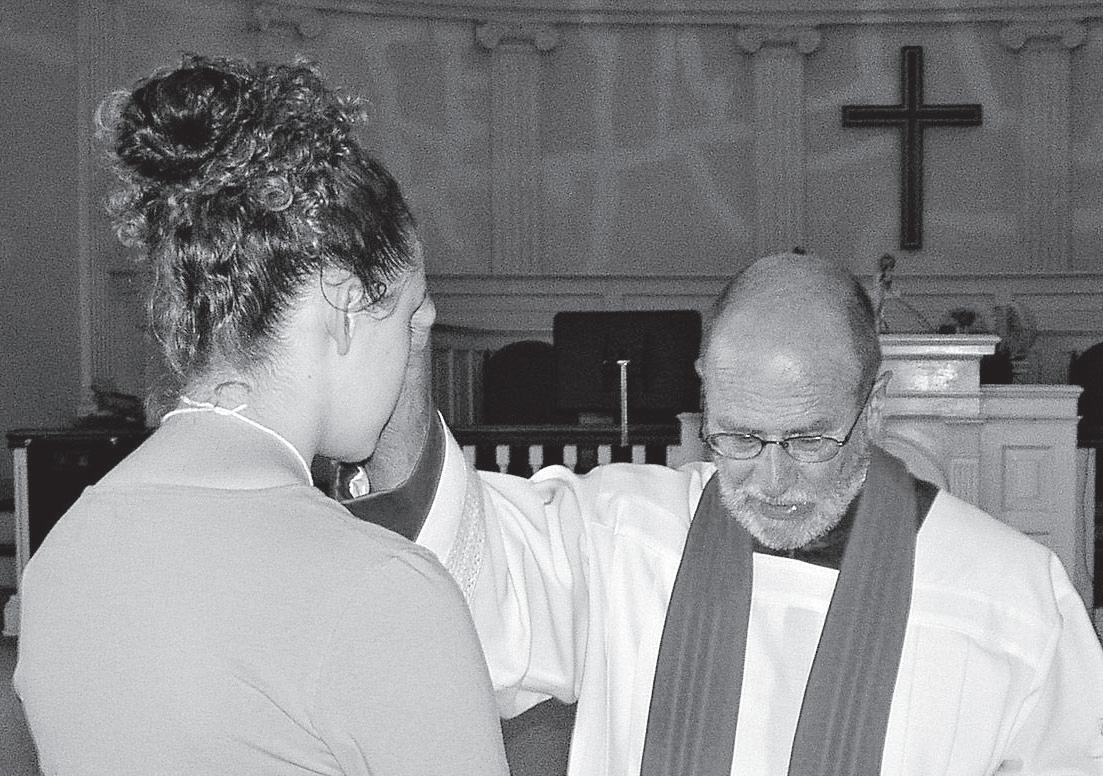

that the essence will remain, changing the connotations for security reasons.
In the end, we found 30 histories, some recounted personally, others gathered on the telephone or the Internet; others taken from rare articles of the Italian press.
Q: In the book’s introduction, Egyptian Jesuit Samir Khalil Samir, professor of history of Arab culture and Islamology at the St. Joseph University of Beirut, addresses the problem of apostasy. Could you tell us the results of his analysis?
Paolucci: According to Khalil Samir, from the study of the Koran one does not glean that there is a death penalty for apostates.
There are 14 suras that speak about punishments for the apostate, but only in one of them is reference
made to the type of punishment and it says that “the apostate will be punished with a punishment in this world and in the next”.
The passage that says “in this world” does not specify how, whereas the Koran in general is very specific about punishments: If one robs, one’s hand must be amputated; if one is an adulterer, one is punished with 100 lashes, etc.
Samir underlines therefore that the fact that apostates are condemned to death according to the penal code of Saudi Arabia, Iran, Sudan, Yemen, Mauritania and Afghanistan, does not derive from a Koranic prescription.
If this is true, Muslim fundamentalists who say that apostates must be killed, do not speak in the name of the Koran. This fact is important
not only for Muslims who convert to Christianity but because, in the last 30 years, apostasy has become the main instrument to eliminate political adversaries.
Very often Muslim Brothers and other groups accuse their adversaries of apostasy; hence, it is no longer a religious problem but a technique to eliminate the opposition. Samir’s analysis on the argument is revolutionary and it is hoped it will spark an internal debate in Islam.
Q: How many Muslim converts to Christianity are there in Italy?
Paolucci: There is no precise data. Insofar as our research is concerned, we can attest to several hundred converts, coming from countries of North Africa, the Middle East and Asia.
Some have been baptised in Italy, others baptised in their country who later came to live in Italy, others baptised in a third country who later came [to Italy].
From the histories we have gathered it is evident that there are many questions that are in the heart of every person: the meaning of life, happiness, love, friendship and what happens after death.
Some of the people we met did not find a satisfactory answer in the Koran and the Muslim education they received; at the same time, they found attractive testimonies of Christians - their friends, work colleagues, neighbours, professorswho were (starting to get) an answer other than the Muslim Koranic.
The different experiences sparked the idea that perhaps it was Christianity - Jesus - and not the Koran, that they were seeking to undertake their human journey.
Q: Tell us about some of the stories included in your book.
Paolucci: An Algerian girl, of a Catholic father and Algerian Muslim mother, born in Varese, Italy, was educated in Islam. One day she went to the institute and had beside her a girl from the ecclesial movement Communion and Liberation, who became her best
friend. She began to study with her.
At 15, she wondered why this friend of hers was always joyful and happy and she asked her: “May I also go on the outings and attend the meetings you organise?” Only after living with groups of young people united by the Christian faith, did she understand that the origin of this joy was Jesus and his love. So she said: “I also want that.”
At first she had problems with her mother who did not agree that she should go to the parish youth centre, to Mass. Then she made up her own mind.
Often, within a Muslim family, the father, mother or community are radically opposed to conversion to Christianity. There are extreme cases of people who are killed if they abandon Muslim customs. From the different stories I have drawn an even clearer conviction that at the base of conversion is the human attraction represented by Christian witness.
A Turkish youth who did not find convincing answers within the Islamic tradition would go to the imam and the latter would reply that he should read the Koran. The Turkish youth read the Koran but did not find the answers. So one day he visited a Franciscan, he asked him certain questions and received precise and satisfactory answers, and this led him to conversion.
Q: Is it true that some have converted by reading the Gospel?
Paolucci: Indeed. There is a Bosnian who fought in the Balkans in the Muslim militias against the Serbs and Croats.
During the night he would listen in the trench to a Sarajevo radio station which transmitted at the same time the speeches of Mustafa Ceric - head of the Muslim community of Bosnia-Herzegovina - and those of Cardinal Vinko Puljic on the war.
Ceric would say: We must undertake the holy war and fight so that this land will become Muslim, and it is the duty of every Muslim to undertake the jihad. For his part,
Page 6 October 19 2006, The Record
PHOTO: CNS
Puljic would say that there would be no peace in this land until we have the courage to forgive one another. Reconciliation, he would add, is the only way that will lead to friendship.
And the Bosnian was impressed by the fact that whereas his leader would incite to the use of arms, his enemy urged reconciliation. For several reasons he came to Italy where he unjustly ended up in prison for a fire in which he was not involved and was later acquitted.
During the time spent in prison, he met a Croatian nun who visited prisoners and she asked him if he would like to read the Koran, but the Bosnian officer replied that he already knew the Koran and wanted to read the Gospel, because he remembered a phrase of Cardinal Puljic who said that in the Gospel Jesus teaches us forgiveness.
The nun was impressed and she gave him a Gospel in Croatian. He read it and a friendship began which in the end led him to baptism.
These are miraculous stories, as every conversion is miraculous.
Q: Is there a pastoral program for converts from Islam?
Paolucci: The Italian episcopal conference has prepared a document, “Catechumens Converted from Islam,” written by Walther Ruspi.
There is in fact much caution because many of the converted Muslims risk their lives. It is a problem of freedom which does not only touch Muslim countries.
Unfortunately, the problem of freedom is also evident in a country like Italy, because Islam establishes only one religion from which one cannot get out. From this point of view, it is very important to ask Muslim communities to recognise their brothers’ religious freedom so that they can convert and live freely.
Q: What are the conclusions you have drawn from this research?
Paolucci: The book throws out three challenges: It challenges Islam to recognise religious freedom; it challenges the civil authorities to guarantee that freedom; and it challenges us “lukewarm” Christians to rekindle love of Jesus.
As is written in Article 18 of the Universal Declaration of Human Rights, approved in 1948, the right to religious freedom is the foundation of every civil society. It is legitimate that the Muslim communities present in our country request protection of their religious rights but, precisely because of this, they must recognise the same right to those who freely wish to convert to another religion.
From this point of view, the Italian civil authorities must guarantee the right and practice of religious freedom. It is not right that a convert from Islam must live clandestinely, go to a church that is 30 kilometres from his home because he is afraid that the Muslim community will punish him.
The third to be challenged is the Church, because those converts are part of the new springtime of Christianity, in a country in which Catholicism has often become an embellishment. During the research, [co-author] Camille Eid and I were impressed by the freshness and courage of these converts from Islam, who said to us: “You do not realise the great treasure you have - Jesus Christ has revolutionised our life.”
Pope sends message with canonisation
Pope canonises four, says being a saint is not for the weak, fearful
■ By Cindy Wooden
VATICAN CITY (CNS) -Presiding over the second canonisation ceremony of his pontificate, Pope Benedict XVI honoured two women and two men who demonstrated that becoming a saint is not for the weak and fearful.
“The saint is that man, that woman who, responding with joy and generosity to the call of Christ, leaves everything to follow him,” the Pope said at the Oct. 15 canonisation Mass in St. Peter’s Square.
Political persecution, poverty, suspicion and even opposition from church leaders were not uncommon in the lives of the four new saints: Mexican Bishop Rafael Guizar Valencia of Vera Cruz; Italian Father Filippo Smaldone; Italian Sister Rosa Venerini; and Mother Theodore Guerin, foundress of the Sisters of Providence of St. Mary-of-theWoods, Indiana.
Even in the midst of “trials and persecutions,” the Pope said, the new saints knew that following Jesus “truly guaranteed a happy existence and eternal life.”
“The saints had the humility and courage to respond ‘yes’ to Jesus Christ and renounced everything to be his friends,” he said.
In his homily, the Pope said, “With great trust in divine providence, Mother Theodore overcame many challenges and persevered in the work that the Lord
had called her to do.
By the time of her death in 1856, the sisters were running schools and orphanages throughout the state of Indiana.”
Speaking in French, St. Mother Theodore’s native tongue, the Pope said that in the Eucharist, in prayer and in her “infinite trust in divine providence,” she found the “strength and audacity” to carry out her mission.
The pilgrims who came to St. Peter’s Square for the canonisation Mass included dozens of young people from the United States.
During his homily, Pope Benedict praised St. Rafael for his dedication to the poor and his commitment to preaching the Gospel and administering the sacraments despite being forced to flee the Mexican government’s persecution of Catholics in the 1920s and 1930s.
Dozens of members of the Legionaries of Christ attended the canonisation Mass to honour St. Rafael, the great-uncle of the Legionaries’ founder, Father Marcial Maciel Degollado.
The 86 year old priest did not attend the Mass; earlier this year, after an investigation into charges of sexual misconduct, the Vatican told Father Maciel that he could no longer exercise his priestly ministry publicly.
St. Peter’s Square also was filled with Italian pilgrims celebrating the canonisation of St. Filippo, who lived from 1848 to 1923, and dedicated himself to ministry to the hearing-impaired, founding the Salesian Sisters of the Sacred Heart to assist them; and St. Rosa, the 17th-century foundress of an order, now known as the Venerini Sisters, to educate young women.
New Saints
Pope Benedict XVI canonized two men and two women Oct. 15.
MOTHER THEODORE GUERIN
French foundress of the Sisters of Providence of St. Mary-of-the-Woods, Ind.
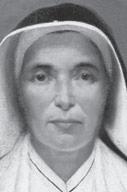
1798-1856
feast - Oct. 3
A pioneer for Catholic education in Indiana, she and her companion sisters overcame harsh conditions in pursuing their ministry in America. Quote: “What strength the soul draws from prayer! In the midst of a storm, how sweet is the calm it finds in the heart of Jesus.”
BISHOP RAFAEL GUIZAR VALENCIA
Bishop of Vera Cruz, Mexico
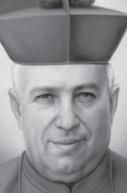
1878-1938
feast - June 6
Dedicated to helping the poor and sick, and a well-liked preacher, St. Rafael faced many obstacles during the government’s persecution of Catholics. He once offered to give himself up to his oppressors in return for the freedom of worship.
SISTER ROSA VENERINI
Italian foundress of the Venerini Sisters
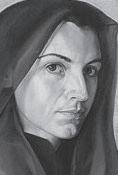
1656-1728
feast - May 7
She opened the first public school for girls in Italy and dedicated her ministry to the education and formation of women. Quote: “I feel so nailed to the will of God that nothing else matters.”
FATHER FILIPPO SMALDONE
Italian founder of the Salesian Sisters of the Sacred Heart

1848-1923
feast - June 4
His priestly ministry was dedicated to the poor in southern Italy, especially those with hearing impairments.
New books provides insight into Catholic youth
Michael Gilchrist, editor of the conservative religious monthly AD2000, says in his book Lost! Australia’s Catholics Today, to be published next week, that the drawing power of Catholic schools remains as strong as ever.
However, Gilchrist says, “the reasons most students were sent to these schools had little connection with their specific catholicity.”
Gilchrist cites survey evidence that “The priorities of Catholics students (and parents) were overwhelmingly secular: vocational, academic, personal and social development being all preferred to religious development.”
Surveys of students, meanwhile, show that belief in core Catholic teachings -- like the belief that Jesus is God -- has plummeted from 70 per cent to 51 per cent in the last two decades.
Amongst the minority of Catholic teenagers who still go to church, most also reject Catholic teachings, Gilchrist says.
“In regard to premarital sex, only 20 per cent of Massattending 15-17 yearolds considered this to be always morally wrong,” Gilchrist says, citing a 2001 National Church Life survey.
system, Gilchrist blames experts in the area of teacher education for undermining belief in the system’s traditional teachings.
One Catholic teacher-educator quoted by Gilchrist, Thomas Groome, has told religious educators they should “approach the faith tradition with a healthy suspicion.”
Another survey cited by Gilchrist shows significant numbers -- more than 40 per cent -- of Catholic school teachers did not agree with the Church on issues of significance in the Catholic community, such as euthanasia, abortion and the importance of weekly church attendance.
Other teacher-educators, meanwhile, have re-interpreted traditional doctrines to accommodate nonacceptance of the Church’s teachings.
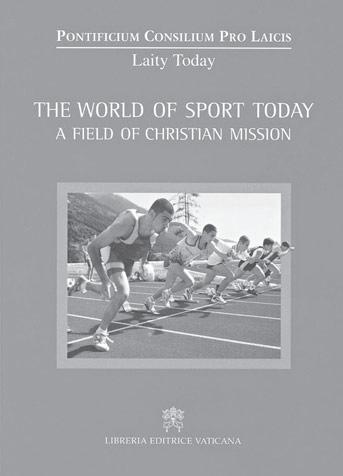
His book says that among younger Catholics, between five and six per cent of those aged 20-29 attend church regularly.
Gilchrist comments: “Most Australian Catholics have attended Catholic schools since the late 1960s, but the Church’s authorities and educators have squandered the opportunity to build up the faith of young Catholics.”
“While the Catholic Church has been the largest single denomination in Australia for the past 20 years, at about 27 per cent of the national population, the percentage of the membership that believes and practices what their church teaches continues to fall.”
In what amounts to a significant attack on the Catholic education
One academic has re-interpreted the Nicene Creed’s affirmation of the Catholic Church as “one, holy, catholic and apostolic,” asserting that being “catholic,” for example, means witnessing “to social justice and peace by enrolling minority and immigrant students,” and teaching “history, social studies and religious knowledge in ways that counter inbuilt prejudices and hostilities.”
Given the poor performance of Catholic schools in faith education, Gilchrist says “many practising parents consider their children’s faith better served by attending nonCatholic private schools or the better state schools and providing catechetical input at home.”
One suggestion made by Gilchrist is that it may be time for Catholic schools to relabel themselves.
“If circumstances today make it virtually impossible for Catholic schools to fulfil their purpose, perhaps they should retire gracefully or call themselves something more appropriate, and stop pretending to be doing what they are obviously not doing.”

October 19 2006, The Record Page 7
©2006 CNS Text and images: CNS and the Vatican
ABC revolution on bias?
The announcement this week by the ABC that it will introduce new guidelines and more careful monitoring to protect itself against bias in news, current affairs and other programming is likely to be welcomed even by those who doubt the organisation’s ability to implement such plans effectively.
Early coverage in other news mediums has tended to focus on political bias, but there is reason to hope that the new guidelines could have far wider application. The ABC is often accused of left-wing bias (whatever that might be) in its political reporting, but there are other biases. It is, for instance, known to many as the GayBC. It definitely has a bias against the Catholic Church, and an even stronger bias against the idea of a moral law. These and many other biases are not confined to news and current affairs, but are trotted out in all manner of programs.
The encouraging thing about the ABC’s ambitious new approach is the appointment of a director of editorial policies to monitor and assess editorial performance across all television and radio programming.
The first result of this new approach should be a significant improvement in the level of professionalism in all sorts of programs, including the programs the ABC chooses when it is buying overseas products.
At the beginning of this month, for example, the BBC’s Panorama program ran a disgraceful piece of “journalism” misusing two Vatican documents to try to establish links between the sexual abuse of children (by others) and the present Pope. Oddly enough, one of those documents, issued late in 2001, was treated in similar fashion (though not directly linked to the Pope) by the West Australian in January 2002 under a front page banner headline “Priest Abuse”. The criticism depended entirely on the paper ignoring Archbishop Hickey’s explanation that the document dealt with the Church’s treatment of a priest as priest, regardless of whether he was convicted, acquitted or not charged as a citizen under civil law. The Record responded with its own front page banner headline “Media Abuse” followed by a full explanation of what was actually going on.
Tell me I’m wrong
Could someone please correct me if I am wrong, but is it or is it not a scientific fact that umbilical cord and adult stem cell research has succeeded in treating some 70 human conditions without resorting to cloning, whereas there has not been a single success to date with embryonic stem cell research?
Is there not a problem with the tendency of embryonic stem cells developing unpredictably as well as being prone to the formation of tumours?
If such is the case, why would any scientist in their right mind prefer to waste time, energy and money dabbling in embryonic stem cell research and by so doing falling behind in the world-wide race for profitable research?
WA leads offering help to poor
Iam writing to you having read your article on Cardinal Pell’s keynote address at the recently held National Catholic Education Commission Conference in Sydney. I was fortunate enough to have attended the conference and heard the cardinal’s address. One of the issues that he raised in his address was his concern that “Catholic schools are not educating most of our poor, especially at the primary level”.
I agree with Cardinal Pell that this is a trend that has emerged in recent years and is one that needs to be addressed. The Catholic Education Commission of Western Australia has done this in a very practical manner with the introduction of the Health Care Card Tuition Fee Discount Scheme.
In a scheme that is the first of its type anywhere in Australia, the holders of eligible Health Care Cards are entitled to an automatic fee discount on presentation of their card to the school. This means that in 2006, parents pay a tuition fee of $120 per year for a primary school student and $800 per year for a secondary school student. Discounts also apply for siblings.
This has been a very significant initiative for Catholic schools in Western Australia.
The emphasis has been on assisting families with limited financial resources. The scheme applies to families already enrolled in Catholic schools as well as those seeking to enroll a child in a Catholic school for the first time.
There has been a concerted effort to remove a potential barrier where parents may not even approach the school because they feel that the fees are beyond their capacity. There is evidence that new families have been encouraged to enroll in Catholic schools.
PO Box 75, Leederville, WA 6902
Tel: (08) 9227 7080, Fax: (08) 9227 7087 cathrec@iinet.net.au
This most recent Panorama pretence is very similar to an attack by that program on Pope John Paul II about two years ago, accusing him of being responsible for millions of AIDS deaths in Africa. Although the egregious journalistic errors in that program were exposed around the world after the BBC screening, the ABC televised it in Australia with nothing to balance it. The Record, at the time, criticised the ABC for televising overseas programs that did not even come close to their own editorial standards.
It will be interesting to see whether Panorama’s latest anti-papal diatribe is screened in Australia despite the fact that its factual flaws and deceptions have been exposed.
Apart from this sort of deliberate prejudice, a lot of bias appears on television and radio because of wide-ranging ignorance.
For years it was accepted as “fact” by most journalists that condoms were the answer to HIV/AIDS. Africa was awash with condoms and awash with AIDS, but condoms were beyond criticism. Anyone against condoms (like the Catholic Church) must be responsible for the epidemic. It took years for health authorities and journalists to begrudgingly begin to admit the facts that the only successes in Africa and elsewhere have been achieved through the Church’s programs teaching abstinence before marriage and fidelity in marriage.
The message still hasn’t been accepted in WA where political leaders (Premiers Gallop and Carpenter, for example) treat as ‘good news’ the claim that “safe sex” is what it is all about, even though the young people to whom this has been taught ad nauseam have among the highest rates of teenage pregnancy, abortion and sexually transmitted infections in the developed world. Safe, indeed!
It is a media “fact” that the contraceptive pill is almost universally good, even though it produces in women a physical state that, if it occurred without the pill, would be regarded as a serious clinical condition requiring treatment.
Divorce is another good “fact”, so its dreadful consequences for adults, children and society are not presented with the clarity they deserve.
Anything that carries a moral measure is treated as suspect and the “balancing” comments about immoral matters are always used, whereas the reverse is not the case.
Even “good” people are treated that way. Recently, the West Australian published a weekly series of magazines about 501 things you should know. The last of them included an item on Mother Teresa, the outstanding woman of the 20th Century. In a thumbnail sketch of about 300 words, space had to be found for what anonymous critics thought of her. There were about 20 other individuals mentioned in that magazine, and none of them had to surrender space to their critics. The unidentified critics did not like the fact that Mother Teresa was opposed to contraception and abortion. It should not be surprising or even worth mentioning that a Catholic nun, founder of a remarkable religious order, extraordinary worker among the poorest of the poor, and a living saint should not favour these modern plagues, but readers had to be reminded that she wasn’t in favour of these self-evident ‘goods’, just in case they were misled into the idea that she was good.
This bias, prejudice or just plain fear about anything that is really good is so common in the secular mediums that one can only grieve for them.
If the ABC can (on professional grounds only) open the minds of its journalists and programmers to rid them of these biases, it really will begin a revolution in public broadcasting.
I can only see one possible reason for this obsession: the thrill of power over defenceless life.
Can spending money on such a sickening scenario be justified?
Whatever the real purpose of such research, it cannot be the relief of human suffering which is obviously better served by adult stem cell research.
G. Aquilina Lynwood
Money management
$350 million drought relief for farmers. Exactly the same amount has been spent to build an 800 capacity detention centre in Christmas Island. There’s brilliant money management for you.
Norm Bernard Brigadoon
The policy of the Catholic Education Commission of Western Australia is that no child will be denied a Catholic education because of an inability to pay fees. The Health Care Card Scheme is an attempt to protect the dignity of families who face difficult times. Catholic school principals also offer a significant range of other discounts to families with limited financial resources. There are many instances where principals offer even greater assistance to families. The strength of the scheme is that the emphasis is on protecting the dignity of the family. Parents do not have to ask for a discount. If they have an eligible card they are automatically entitled to a discount.
In 2006 approximately 16 per cent of the 66,000 students attending Catholic schools have benefited from this scheme. It is important to remember also that in some Catholic schools such as those in remote areas, no tuition fees are charged. These schools are situated in some of the most disadvantaged regions in Australia. In these locations the Catholic school is a visible presence of the Catholic Church working to assist those in greatest need.
The Health Care Card Tuition Fee Discount Scheme has sparked interest from several other dioceses with at least one other diocese implementing a similar scheme in 2006.
Monsignor Michael Keating Chair of the Catholic Education Commission of
Western Australia.
Bishop “alarmed” at enquiry
Continued from page 1 bishops - leaked in October to The Tablet, a British Catholic weekly - the archbishop said the congregation wished to be informed of “the financial structures and of the situation ...in every diocese”.
The Lancaster case arose out of confusion between civil law, which treats a diocese and its parishes as a single unit, and the Church’s Code of Canon Law, which sees a parish as a distinct body within the diocese with its own money and assets.
Believing the diocese to be “asset rich”, for nearly 15 years lay staff in Lancaster had spent parish funds and used cash earmarked for other purposes.
Among the funds taken was money Bishop O’Donoghue saved from the 2002 sale of his 16-room residence, which he had exchanged for a modest
one-bedroom apartment in an attempt to “break free” from the customs, traditions and bureaucracy.
These traditions held him back from being a more effective pastor.
Much of the money had been spent on ambitious projects such as an interfaith centre and on staff salaries.
The debt came to light when the bishop commissioned a financial review after he grew suspicious about how the diocese was funding itself.
Bishop O’Donoghue told Catholic News Service that he was later summoned by Archbishop Sainz to explain how the situation could have occurred.
“I was absolutely alarmed, I couldn’t believe it,” he said.
“I explained that I was aware that we had a very large staff
and couldn’t understand how we were funding it.”
He added that the Vatican was pleased with the way the diocese had since approached “the issues and how we have set about rectifying them”.
He said the Vatican now sought assurances from all the dioceses that they were “acting in line with canon law and treating parish funds and properties as belonging to the parishes”.
John Gibbs, financial secretary of the Archdiocese of Westminster, confirmed that the Vatican was seeking the “reassurance that canon law is being observed in the conduct of each diocese”.
“Each diocese will have to respond to the letter they have received, answering the question that has been posed,” he said.
Page 8 October 19 2006, The Record
editorial
Perspectives
Around t he tabl e dnuorA t eh lbat e LETTERS TO THE EDITOR letters to the editor
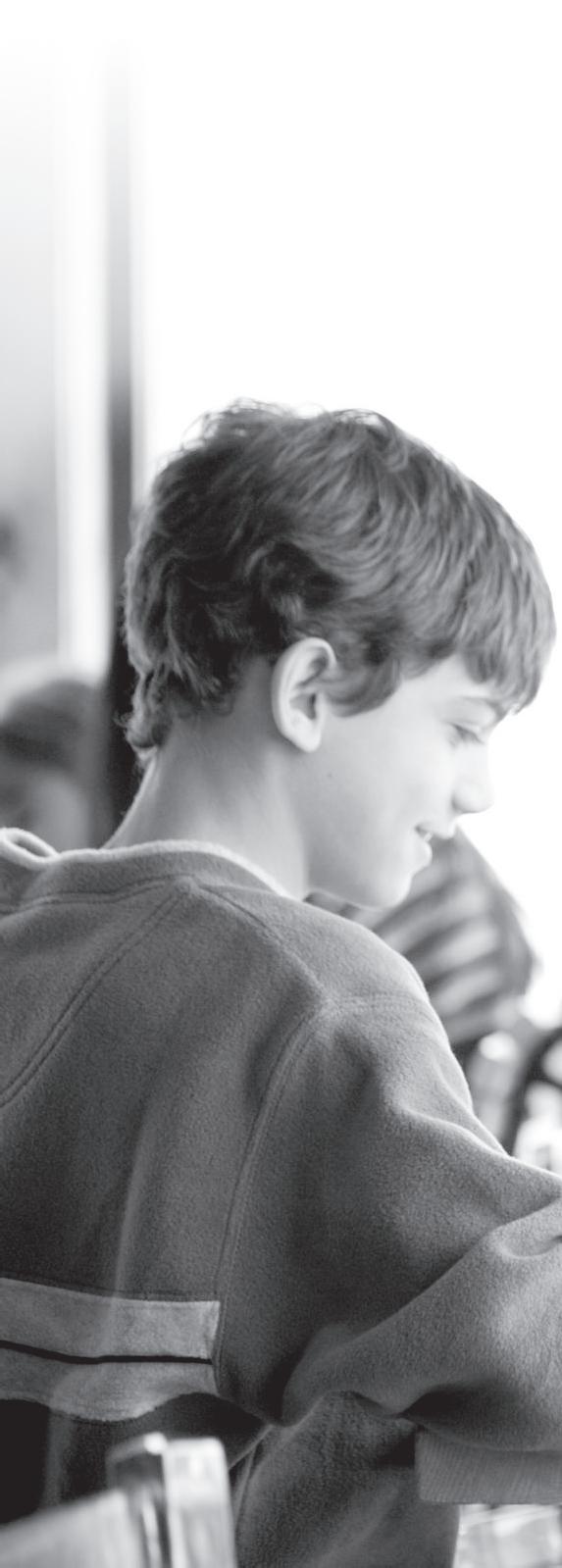
Fortifying youth

Few mothers and fathers would disagree that parenting in today’s society is harder than it was in their parents’ day. Society has changed and outside influences upon children are stronger than when they were children. Families are smaller nowadays; both parents work and often cannot spend as much time with their children as they would like; and the television is on for hours in many homes. Faced with these challenges, people are beginning to realise that they cannot rely on their good will alone to raise their children successfully. They have to study how to be a good parent and act according to clearly defined principles.


What every parent needs to know
■ By Andrew Mullins
Parenting is the art of raising happy, mature, generous adults, not merely happy children. The ultimate outcome of parenting is mature adults.
Unfortunately most parenting books are tactical rather than strategic. They overemphasise “micro parenting”: how to have a happy child (not how to raise a happy adult), how to avoid tantrums, how to talk to an adolescent, how to change a nappy. This leaves parents in the dark about how to raise children who have a clear set of goals and values. Good parenting focuses on long-term outcomes, not just the immediate physical and emotional welfare of a youngster. Parents need to think in terms of building character. They should visualise the strengths of character they want to see in their children and then work at equipping them with these strengths.
Children cannot be happy without firm values. Successful parenting is about passing on good values so that boys and girls become happy in their lifetime commitments to their future families. Good behaviour is one outcome of having good values, but it is not the ultimate goal of raising a child. It is possible to raise well-mannered, capable, hard-working children who become self-centred, ruthlessly pragmatic adults who are unable to make lasting commitments.
We need to strive to ensure that all our actions are underpinned by a kind and loving intention. In life, we need to have well groomed behaviours (eg orderliness, industriousness,
sincerity, etc) and these behaviours need to be underpinned by a loving intention. This intention is crucial. We must model it and insist on it even with small children. It is much better to teach a child “Do this because it will help Mum”, rather than to say, “Do this because I said so”.
However, many parents fail to pass on good values. There are three reasons for this.
First, contemporary parents often do not have clear values to bequeath to their children, beyond “do what you think is right” and “don’t hurt anyone deliberately”. In today’s world, where young people are exposed to many harmful, but strong and attractive, influences, this is not enough.
Second, some parents who do have good values treat them as a burden. They must show that the values they speak about do in fact make them happy, and make their homes happy places. Otherwise children will think, “Mum and Dad, I love you, but I need to find happiness in life. I will need other values.”
Third, like parents of any age, sometimes mums and dads do not live up to their own values. Parents who wish to pass on cherished religious beliefs and practices will need, above all, to model those practices in their day as an expression of heartfelt gratitude towards God, and to show that these beliefs and practices are the source of deep peace and equanimity in the face of every small and great challenge that life can bring.
The first twelve years are the key ones, not the teen years. Contrary to what most people think, the teen years are not the testing time for parenting skills; the toddler years are. All

teenagers were once toddlers and their problems in adolescence are simply the unfolding of the strengths and weaknesses they acquired, with their parents’ help, as young children. So parents ought to focus on inculcating values from the word go, rather than leaving it until they stumble across problems. Most of the hard yards are done before teenage hormones kick in.
Upbringing is not about cloning children to conform with your wishes. You are raising them to run their own lives so the less you run their lives, even when they are small, the better. Do not over-manage even young children. Don’t do the thinking for them. If they do not have practice thinking for themselves as younger children, they will not be able to do it as teenagers, and you will not think of giving it priority when they are teenagers. Give reasons, starting from when your child is very young. Young people will need a comprehensive reference manual if they are to run their own lives. Explain simply and honestly the why of decisions you have made in their interests because there has been physical or moral danger involved in following the child’s preferred direction.
Establish very positive habits of communication. Take conversation, even with little children, seriously. Don’t be negative. Start with what you admire in your son’s or daughter’s character. From early years, make praise very specific and criticism positive and constructive. Without habits of parent-child affection and focused attention in the pre-teen years, the parent-teen bonds will strain or snap.
Talk honestly to younger children about relationships and sexuality. You have a real and pressing duty to ready your child for the complex but positive challenges of sexual attraction. How many marriages will be saved if children were better attuned to the duties that relationships bring?
The teen years don’t have to be difficult.
Adolescence should be a wonderful time when boys and girls discover autonomy and decide on the values upon which they will
base their lives. The physical and psychological changes of adolescence often involve some turmoil, but if children have developed the key virtues of sound judgement, not giving up, self-control and respecting others as toddlers and children, they will be well equipped to deal with it.
Mum and Dad are behind the steering wheel. We often blame poor behaviour on peer-group pressure and negative images in the media. But good parenting calls for strategies to anticipate and counter these influences before they take root in children. Parents must be responsible for shaping the family environment - if they want to raise children with their own values, they have to be creative and energetic in finding ways to keep them from being hijacked by purveyors of other values.
Children will imitate anyone who spends time with them and takes an interest in them. This includes characters in videos, X-Box, and chatrooms. Children are far too precious to allow the nasties of unsupervised television and Internet access into their minds. Get to know your child’s peer group, and the parents of your child’s friends. Make it easy for them to bring their friends home.
It has become a cliché of parenting that children should not be “sheltered” from real life. This is nonsense. Children shouldn’t be swathed in cotton wool, but every family should be a sheltered family.
Children can be seriously damaged in adolescence and early adult years when, through inexperience and lack of clear knowledge of what is right and wrong, they make decisions that have lasting negative consequences. Permissive parenting leads to many problems in children because they fail to develop strengths of self control and fortitude. Manage the environment that your children are growing up in, but don’t become recluses.
Don’t raise your children in a bunker; spend much time with other families who share your values. Your children need to see you give of yourself and your time in deep friendships with others, otherwise they will not learn this.
October 19 2006 Page 1
Vista
Building Character in your kids
■ By Andrew Mullins
How children grow in character
Good character means developing good habits, or virtues.
The development of character requires developing the full range of virtues. Virtues are normally acquired by carrying out a good act with some regularity, which over time builds an enduring strength of character.
For example, the repeated effort to be polite regardless of one’s feelings builds up the vir-


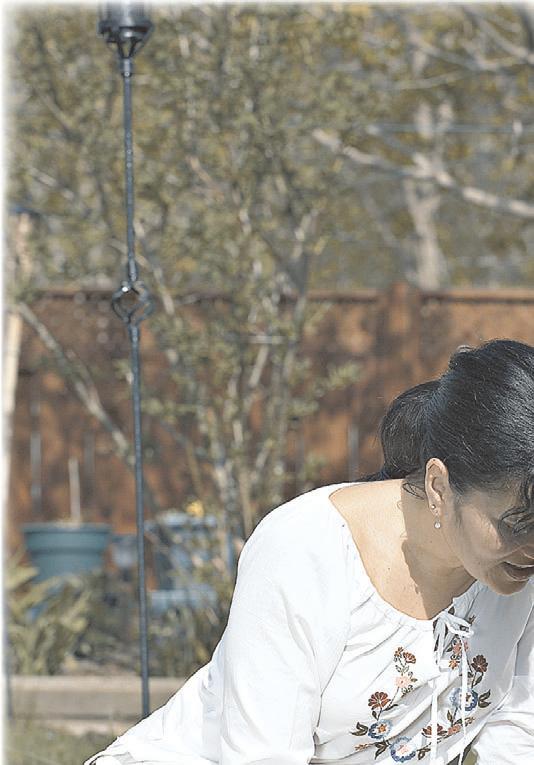
tue of charity and respect. During the past 40 years, much of Western society has shied away from the concept of virtue and embraced the ideals of spontaneity and innate innocence.
Consequently, as any school teacher will tell you, many children enter adult life without the habits of resilience, responsibility, and respect for others they need to run their own lives. They simply have not been taught to struggle against weaknesses inherent in human nature.
In some ears, the word virtue sounds oldfashioned and implies hammering harsh and unwelcome lessons into recalcitrant young-
sters. The truth is quite the opposite. The most effective tool for teaching virtue is affection and its distinctive result is ease and enjoyment in the good habit. Children learn through positive example, loving confident encouragement to meet challenging expectations, clear consistent explanation and direction, routines and responsibilities with accountability and clear constructive correction. Our goal is to teach children to think clearly for themselves, free of debilitating habits and external influences, and to have a generous loving heart.
What are the most important virtues?
Sound judgement is a virtue for all children. Even pre-schoolers can practise making good decisions - whether to eat now or later, whether to help mum do housework or play games, and so on. They are making decisions without realising it, with their parents’ guidance. But the defining characteristic of the teen years is self-direction and thus sound judgment becomes an important issue. Parents should not be scared when they observe a growing independent spirit in their son or daughter. They should not react with panic and legislate rules as if their teenager were still a child.
means doing jobs for the welfare of the family, studying very hard, using entertainments with moderation and not as an end in itself, responsible use of cars, reasonable use of telephones (by limiting oneself to short calls, and making sure to ask permission before using the phone), and so on.
of their children by smothering them with childish pampering. Nor should they look on fondly, saying “kids will be kids”, as teenagers, who, in other times and cultures would already have adult responsibilities, exhibit irresponsible behaviour. Children must be taught that affection is not best shown in material gifts; people are more important than things; good times are not necessarily more expensive times; and we have to resist the allure of what is shiny, new or colourful.

Western society has a 2500-year-old tradition of discussion about the idea of virtue. It began with the early Greek philosophers who identified four core virtues: prudence, temperance, justice and fortitude. In modern parlance, we would call them sound judgement, self-control, respect for others and resilience. Of course the Greeks did not invent these good habits. Judaism and Christianity assumed them in their moral teaching, as did the great traditions of the Oriental world. But the Greeks, especially Aristotle, were the first to analyse the virtues.
A bit of familiarity of what constitutes each virtue is not airy-fairy academic speculation. Children will need each of these four main virtues to have happy lives, to have successful relationships and to cope with the burdens and challenges that life throws up. Equipped with a framework for identifying a child’s strengths and weaknesses, mum and dad together can discuss strategies to help them grow.
Sound judgement (prudence)




The word “prudence” can mean timidity, indecisiveness and calculation. But true prudence is a dynamic virtue which allows us to use our freedom in the best way, the way which leads to true self-fulfilment. A prudent person will not hanker after illusory roads to happiness.
The great challenge in raising children is to give them a sense of responsible autonomy and to teach them self-management skills. We cannot give young people enough decision-making practice - appropriate to their age, of course.
Usually, it is far more effective to let teenagers choose what they are going to do, unless they are venturing into physical or moral danger through their lack of experience, and then to debrief afterwards. They should be encouraged to make their actions consistent with their values, a prerequisite for peace of soul and happiness in life. In loving conversations, help a young person reflect on the causes and consequences of his or her actions, particularly how those actions have affected others.
Another aspect of sound judgement is judging according to principles. Many adolescents (and adults, for that matter) do not have any coherent principles which guide their actions. It is important to talk with children, especially teenagers, about ideals and causes; and not only to talk about them. Successful parents lead by example. It’s a good idea to throw yourself into idealistic causes, and talk about them at home with a passion. Be a model for the happiness that comes from helping others. In particular, generosity is best taught by example - in giving money to good causes, in sharing things, in doing jobs for elderly relatives.
Respect for others and Responsibility (justice)
If children are to truly respect others, they need to work up effective habits of being other-centred. Young persons today have a great many privileges: full room and board, loving parents, access to education, a great variety of entertainment, relative freedom of movement, ease of communication, etc. With these privileges must come the serious responsibility of using them well. This
What are the priorities of a good parent?
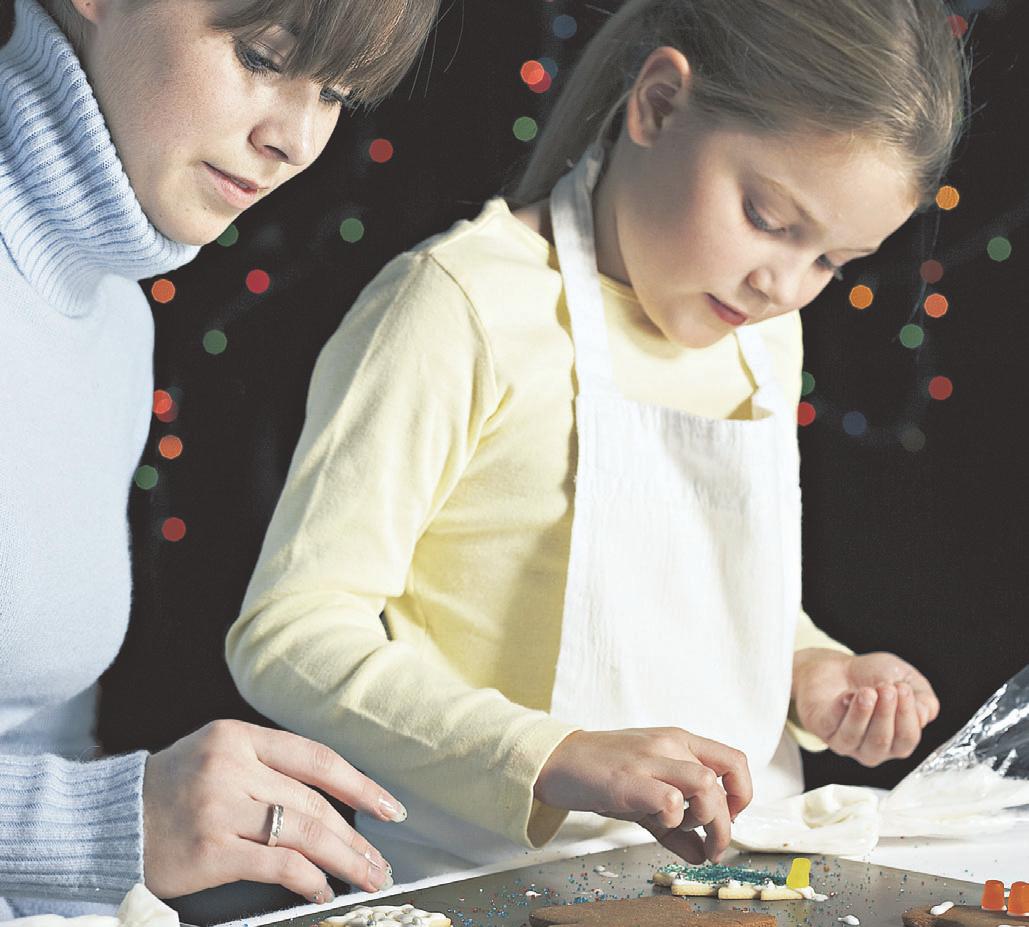
Love and respect for your spouse, yourself and your kids goes a long way to producing well-adjusted human beings
■ By Andrew Mullins
First: your spouse. A good marriage is the bedrock of good parenting. If the spouses love each other, are prepared to sacrifice for each other and communicate well, their children will absorb their virtues; but, as everyone knows, this demands a daily struggle. Learn to admire the strengths of your spouse; don’t get fixated on faults. Put your spouse on a pedestal in your child’s eyes; back up the other’s decisions. Couples need to know how to make decisions they are both happy with. They need habits of talking out differing opinions on privileges, punishments, ground rules, etc.
It’s a good idea to create regular times you can get away from immediate pressures to talk each week, to listen to what each is saying, or wants to talk about.
No matter, neither bankbook nor bed-
room, should be off limits for calm discussion. Couples should organise to do things together often, building up a stock of happy memories to tide them through inevitable challenges.
It is best if parents never contradict or argue in the presence of children, and ensure that they make up in their presence if they do argue in the child’s presence. It is a great skill to develop the habit of being able to apologise - it can save relationships. Adults need to learn to be the first to apologise whenever there is an argument.
A couple’s joint effort to create a good marriage pays off. Statistics show that children who grow up in homes where there is significant ongoing discord between parents (either before or after separation) are at greater risk of psychological problems. Similarly, children raised in homes where there is only one natural parent are disadvantaged on every measure - socio-economically, emotionally, psychologically, academically, etc.
Second: yourself Children are chips off the old block. It’s hard to expect them to acquire virtues which their parents lack. That’s why it is important to look honestly at what your own motivations in life might be - success, admiration,
It is important to ensure that children have appropriate responsibilities, small daily jobs for the good of the family; and it is important for parents to follow up those jobs that have been given, holding children to what they have agreed to do. Expect responsibility. Don’t let your son or daughter out of consequences they have brought on themselves. They have to pay back the phone bill, make the apology or submit the assignment. Don’t fight their battles for them. In the teenage years, life will bring challenges for which they have to be ready. The principle also applies to work: if you fail to teach a young child the importance of responsibility in finishing jobs don’t expect assignments to get priority in teenage years.
If our children are to make this world a better place when their turn comes, they will need to have acquired a deep concern for justice. But children will only see time as a gift and develop strong habits of service if these qualities are modeled in the adults they admire.
Self-control (temperance)
Self-control is a virtue which develops very early in life. We live in a very consumer-oriented society in which people really believe advertising slogans like “you deserve it” or “indulge yourself”. If parents don’t educate their children to exercise restraint, their youngsters will be unable to resist the lure of materialism.
Parents must not retard the development
Foster a healthy hardiness so that your child will have learnt a degree of self-control. There are alcoholics who grew up in teetotalling households and alcoholics whose parents gave them moderate amounts. The key issue is whether a young person has learned habits of self control.
Resilience (fortitude)
Mental resilience empowers a child to keep trying even after many failures and to bounce back after making mistakes. Let your child wear his or her mistakes. Children must learn to solve small measured problems so that they will not be swamped when the real problems arrive. Their future happiness will depend on their capacity to solve their own problems in adult life. It can be a serious error of judgement for parents to do things for their children which the children are able to do themselves. Do not shield kids from the small difficulties that they can experience as a child.
Do not fight their battles for them, if they can fight them themselves without physical or moral danger. Do not write notes to get them out of trouble for forgetting homework. We should protect children from moral or physical harm, but we should not be scared of a child making mistakes (provided there is no lasting damage). We are preparing children to run

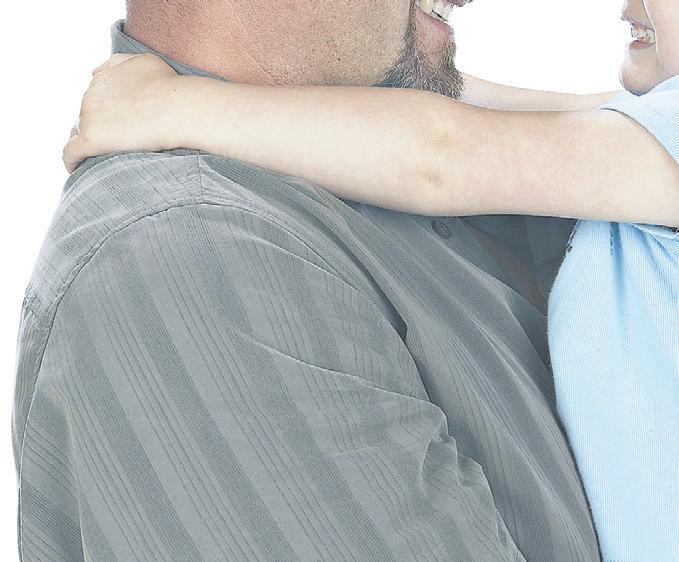

their own lives successfully, therefore they need abundant practice doing this when they are still children. More important than avoiding mistakes is the sincerity to recognise mistakes for what they are, the determination to remedy any hurt done to others, and the habit of learning from mistakes. Parents need to keep a focus on sincerity, and on the development of this loving intention, in their children.
Preparing teens for permanent loving relationships

Many parents are reluctant to speak with their children about the birds and the bees. They can become almost paralysed when it comes to talking about how to relate to the opposite sex. Yet it is essential for parents to help teenagers think through relationships in terms of the virtues of sound judgement, self-control, resilience and, most importantly, respect for others. This challenge of adolescence is a kind of final exam in character education, when everything a young person learned as a toddler and a schoolchild is put into practice. If they have learned earlier lessons well, it is likely that they will survive adolescence without any major calamities and will go on to be mature husbands and wives, father and mothers.





Each young person needs an effective and loving education in relationships and in the sexual dimension of human life. Yet, the reality is that most children of this generation will be disappointed in relationships, some tragically so. Nobody is better placed to pass on this intimate information by word and example than a child’s own parents. Too often however, this task is left to teachers, peers, or television.
Encourage children to mix with and get to know many boys and girls their own age. Teach that the aim of social life cannot simply be to find “the one” girlfriend/boyfriend... with all the emotional obsession that premature relationships create. Young people need to understand the good reasons for not pairing off in mid-teen years, despite the constant

negative example in this regard in the media.
The teen years offer challenges which young people have never experienced before. It is good for parents to explain explicitly how certain uninhibited social venues like raves and some discos make it much harder for a person to maintain self-possession. Explain how certain heady times, such as the weeks after final school exams finish, can put a young person under pressures never before experienced, leading to mistakes one may regret bitterly.
Andrew Mullins is Headmaster of Redfield College, an independent school in the northwest of Sydney for boys in Years 2-12. He is the author of Parenting for Character.
comfort, pleasure, or something higher.
Beware of living for oneself - putting one’s own timetable before that of the family, work before family, social life above investing time in one’s children each night.
Teach by your example that it is loving generosity that brings happiness in life. Carry about with you a habitually deep peace and calm. Lead by example. Show that commitments to others bring great serenity. Try not to load this deficit onto your kids.
In particular, if you feel that it is important for your children to take their religious duties seriously, make sure that you do so first.
Children learn how to love God by looking at the lives of their parents.
Third: your kids
Children need to feel loved. But it can be hard for some parents to show this in a convincing way, especially busy professional men. Many parents can fail to listen, to take conversation with small children seriously, and to give them focused attention. The problem becomes even more urgent with teenagers. They need unconditional love and encouragement too. Do not let 90 per cent of conversation get bogged down on negative issues.
In today’s families, time is a scarce
resource, but for building up a close relationship with children, there is no substitute for spending time. The notion that quality time is better than quantity time is a myth. There is only one kind of quality time and that is quantity time. Do jobs together. Find hobbies and sports to do together that you both enjoy. Make sure that home is an enjoyable place to be, otherwise your children will not want to bring friends home. You will be excluded from their social world. Remember, the habitual expression on a parent’s face determines the atmosphere in the home.
And keep reminding yourself, you are raising children so they can run their own lives well. Some parents punish children to scare them into good behaviour, or simply to gain conformity with what they want. Too often in such a process, parents and children are alienated.
It is always more effective to correct children calmly without emotion, choosing punishments that help a child remedy the consequences of poor actions, and making sure that the child realises the most important thing is to fix up the hurt done to others by heartfelt apologies. The purpose of punishments must be to teach, not to make an example of someone, or to frighten them into doing the right thing in future.
Page 2 l October 19 2006, The Record October 19 2006, The Record l Page 3 Vista Vista
Opinion
In this Valley of Tears: Carrying Peace to the World

Being Heard
■ By John Heard
In the New York Times last week, following North Korea’s claim that the Stalinist state had detonated a nuclear weapon in underground tests, William Broad and David Sanger counted nine nations with a known nuclear capability (Israel remains undeclared) and at least 40 with the technological capacity to build nuclear bombs. Australia – although our politicians rarely state as much – is one of the 40. It is also not ridiculous to state, therefore, that at some point in the future an atomic weapon may be used again in war.
President John F. Kennedy, a Catholic and the man who shepherded the world through the Cuban Missile Crisis, which represents the most serious and best known threat of doomsday confrontation, once stated US foreign policy towards the then USSR in this way: “...we will not prematurely or unnecessarily risk the course of worldwide nuclear war in which even the fruits of victory would be ashes in our mouth.”
This week, however, children in WA and around the globe knew perhaps for the first time that there are those who would risk such a conflagration, that in North Korea there rests a tyrant who starves his people to build nuclear fear.
Similarly, some months ago, the president of Iran threatened what would amount to a modern day Auschwitz, calling for the Jewish State of Israel to be “wiped from the map”.
Our children have learned, and we adults were reminded, that we live in a world marked by the Fall, where reason sometimes dies away and great darkness is threatened.
Thank God that in both contemporary cases the threats remain threats, however disturbing.
This dire state of affairs, however, should come as no surprise to Catholics. That’s because Catholic teaching on social justice and natural law does not aim to set up earthly utopias or invincible empires, rather it provides a guide to ensure appropriately constituted government, which serves the common good so that our laws can mimic, however feebly, the order inherent in the universe. In this model, setbacks are not the failures that seem to cripple the UN; they are proof of what we’re up against and serve as timely calls to work harder for harmony. We must throw off idolatrous expectations that governments or leaders can ever really keep us safe from harm. They can’t. No man can forever.
And because we do not put our faith in salvation by treaties, or expect deliverance from evil to come from mere men, we Catholics should not lose our cool when crises threaten. Rather, we should be calm and firm, dedicated to peace and disciplined into the kinds of people – the presidents, the Popes, the schoolteachers or employers – the world needs.
And we have other models beyond JFK. We have war-threatened Popes, who have called the world and our elected leaders to a lasting peace based on real justice,
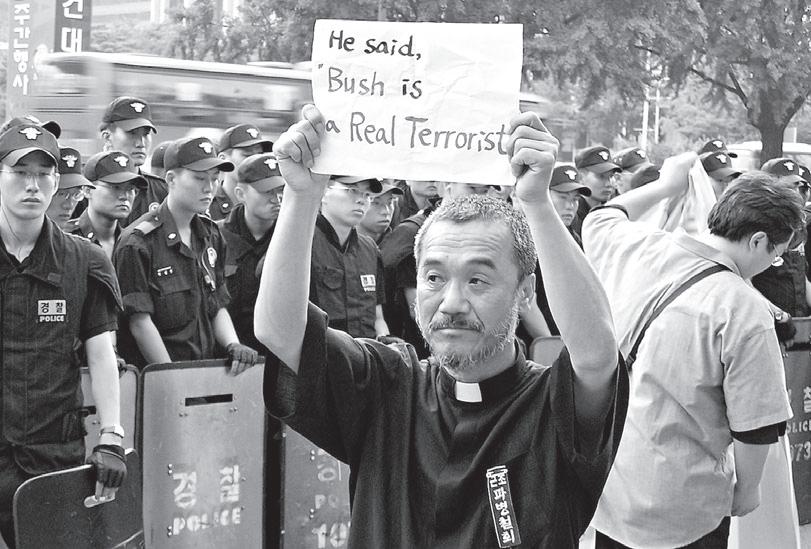
not compromise or self-interested politicking.
Alongside Blessed Pope John XXIII, whose memorial was celebrated recently, we must rediscover constant Catholic teaching: “...from the warning call of Pius XI which looked to true peace ‘not as written into treaties but rather as sealed in the hearts of men’ (cf. the bull “Infinita Dei,” May 29, 1924; cf. A.A.S. XVI, 1942, p. 213), to that fervent last appeal of Pius XII on the 24th of August 1939: ‘It is by the power of sound reason, not by force of arms, that justice makes its way’ (cf. Pius XII Discorsi e Radiomessagi, I, 1939, p. 306),” and realise that their solutions fit almost perfectly the miseries of our own age. As Catholics, we have a truly inspiring tradition, an intellectual and temperamental understanding of human strife and conflict
garnered from a: “...whole series of pleadings, sometimes deeply sorrowful and moving but always paternal, calling upon the whole world to guard against the danger while there is yet time, and assuring the nations that whereas everything is lost, and lost to everyone, through war, nothing will be lost through peace” (John XXIII Message for Peace September 8, 1961).
We can, and indeed we must if we want the most recent threats to remain just threats, take up this tradition. We must teach it in our schools and carry it into elected office. We must offer it to our brothers and sisters and serve the cause of peace in our homes, families and places of work.
If we’re serious about following the Man of the Beatitudes, we know that making peace will lead us faceto-face with God.
Lord, deliver us from evil, because no one else will
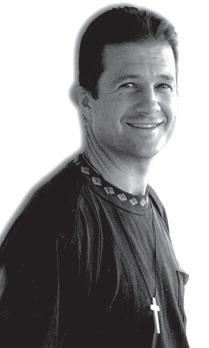
i say, i say
■ By Mark Reidy
My encounter with a man who called himself, “Mack the Knife” in Bosnia in 1995 was one of several incidents that altered the way I perceived evil.
As we shared a beer in the far corner of a hot and dusty refugee camp, I listened in horror as this young soldier shared with me how he had stabbed to death 27 people.
Initially he spoke with pride of his achievements and the service he had done for his country, but behind his emaciated, unshaven face, the hollowness in his eyes told another story.As his consumption of alcohol continued, the torment that dwelt within began to surface.
Soon his anguished cries echoed around the campsite as he battled to comprehend what had driven him to such brutality. I had been raised in a Catholic environment that made little mention of the concept of evil.
In hindsight I realise that I accepted it simply as the “absence of God”. I didn’t believe it was a force in itself, but more like a vacuum of emptiness in which divinity did not dwell. My six months in Bosnia gave me a different understanding.
It stirred in me a sense that there was a battleground beyond what I saw or heard.
There is an Ethiopian proverb that says, “Evil enters like a needle

and spreads like an oak tree” and the reality of this was all around me.
Those I met would share with me the horror of their experiences: of children brutally and sadistically murdered, of the systematic torture and rape of young women, of people who had been friends for years suddenly beating and killing one another.
Inexplicable acts of brutality and violence that continually spiralled into deeper levels of darkness.
During my time in Bosnia, this
malevolent frenzy climaxed with the massacre of over 7000 Muslims in the town of Srebenica.The stories of transformation from neighbour to savage seemed endless. Mack the Knife was one of these.
In retrospect he could not rationalise or justify his murderous behaviour. It wasn’t the person he was before the war, he wept. He didn’t know the man he had become. So what is the force that drives this mania?
In a recent SBS documentary, “The Anatomy of Evil”, Danish
filmmaker, Ova Nyholom, attempted to psychologically investigate the motivation behind war atrocities.
He interviewed Nazi soldiers from WWII and soldiers involved in the Srebenica massacre.
The only hypothesis he could provide was that evil is a reality, an entity in itself, and it can be freely chosen by an individual. He concluded that the instinct of self-preservation was what caused individuals, and even nations, to succumb to this evil.
Nyholom was shaken by his journey into the darkness of others.
It rocked the foundations of his own certainty that, in the same circumstances, he would have acted differently from those he interviewed. He is right to doubt himself.
We are all born with the propensity to think of ourselves first in any given situation. It is why Jesus left us with the example of perfect selfsacrifice and the power to overcome this weakness. His life, death and resurrection are the spiritual polar to our instincts of self-preservation.
Instincts that are vulnerable to the forces of evil that exist to draw us away from God. In the only prayer that Jesus ever taught us, He asked us to pray to His Father to “deliver us from all evil”.
These are the words that each of us must regularly pray with great fervour.
Page 4 l October 19 2006, The Record Vista
Sorrow: Thousands of women prayed in a ceremony in Srebenica on the seventh anniversary of the massacre of 8000 people by Bosnian Serbs.
Protest: Seoul riot police stand ready as a priest demonstrates. PHOTO: UCAN
The World FEATURE
Religious tolerance on agenda
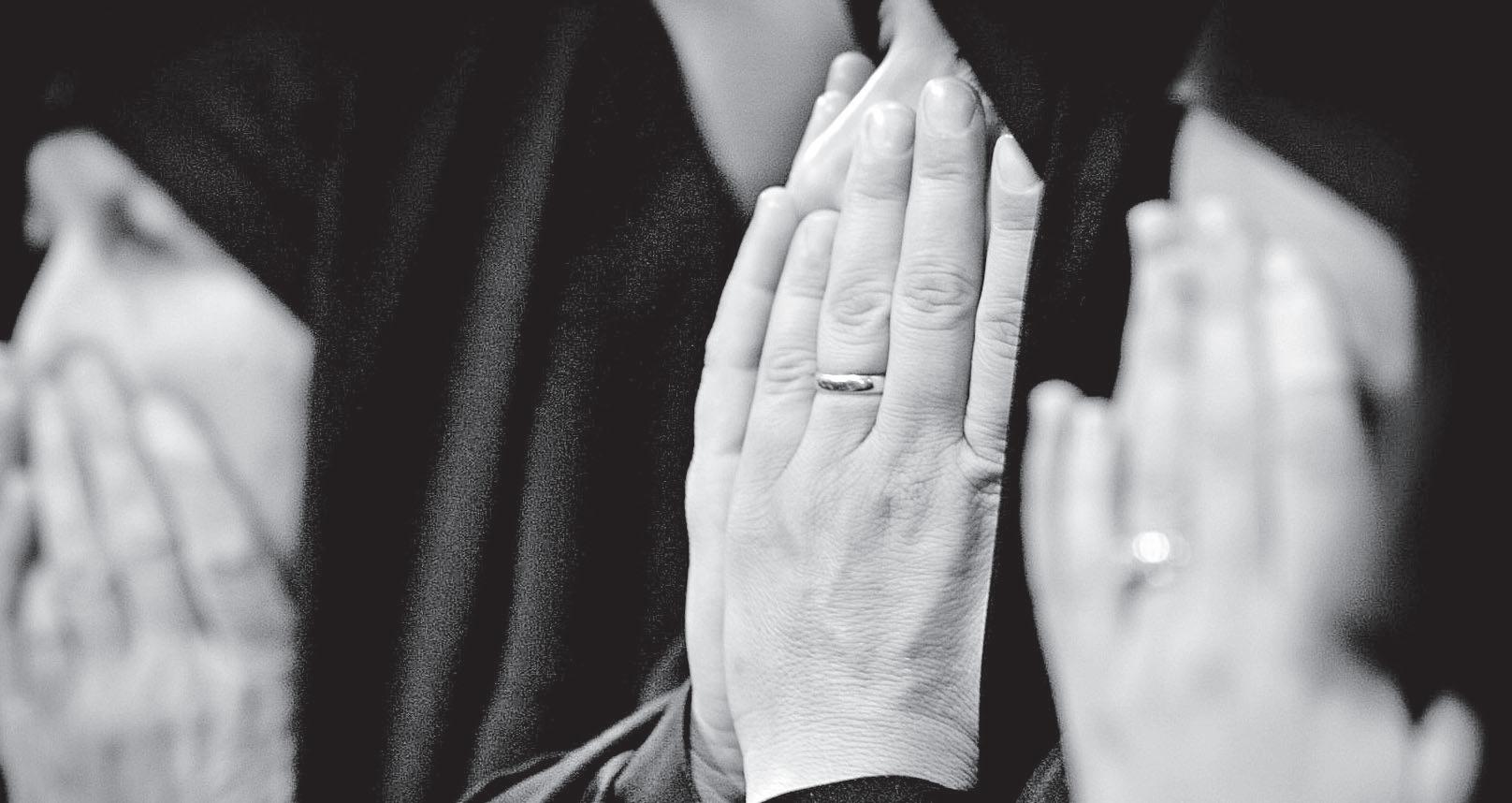
Buried amid the controversy around the Pope’s recent remarks about Islam was the United States’ “2006 Annual Report on International Religious Freedom.” The report covers the situation in 197 countries and territories in the year ending June 30. The US State Department submits the annual report to Congress as required by the International Religious Freedom Act of 1998.
“In today’s world, our goal of fostering religious freedom and tolerance beyond our borders is an essential component even of national security,” explained Secretary of State Condoleezza Rice when she presented the report on September 15.
In the report’s introduction John Hanford III, ambassador at large for international religious freedom, expanded on the rationale behind the document: “This report is a natural outgrowth of our country’s history.”
“Our own record as a nation on this and other freedoms is not perfect,” Hanford admitted. Nevertheless, he insisted that religious liberty is a precious concept in American history and that the report aims at making the right to this freedom a reality for all humankind.
A number of governments, however, actively work against the right to religious freedom, the introduction said. And in some countries extremists seek to exploit religion “in the service of an ideology of intolerance and hate,” attacking those who seek to worship differently.
The report met opposition by some of the countries singled out
for criticism. A spokesman for China’s foreign ministry said the report was “groundless” interference in his country’s internal affairs, according to Reuters.
Saudi situation
The report also produced a conflict with an agency within the American government, the US Commission on International Religious Freedom (USCIRF). In a press release issued the same day as the report, the chair of USCIRF, Felice Gaer, declared: “The commission is simply shocked that the department removed long-standing and widely quoted language from its report that freedom of religion does not exist in Saudi Arabia.”
“The commission continues to conclude that freedom of religion does not exist in Saudi Arabia,” stated the press release. The USCIRF objected that the improvements in religious freedom mentioned recently by the US government have still to be implemented.
Nevertheless, the State Department report had strong words of criticism for Saudi Arabia.
“The government does not provide legal recognition or protection for freedom of religion, and it is severely restricted in practice,” it noted.
There is not even a legal right to religious practice in private. The report did state, however, that the Saudi government has made some appeals for religious tolerance. There was some evidence, as well, of a decrease in arrests and deportations of non-Muslims on religious grounds.
Even so, the report observed that in general the Saudi government
enforces a strictly conservative interpretation of Sunni Islam. And Muslims who do not adhere to it can face significant societal discrimination and serious repercussions at the hands of the religious police.
Categories of abuse
Overall, the report identified diverse types of abuses regarding religious liberty:
- That type carried out by totalitarian and authoritarian regimes, which seeks to control religious thought and expression. In these countries some or all religious groups are seen as enemies of the state because of their religious beliefs or their independence from central authority.
- State hostility toward minority or non-approved religions. Governments guilty of this type implement policies like demanding that adherents recant their faith; forcing adherents of religious groups to flee the country; and intimidating certain religious groups.
- Failure by a state to address discrimination or abuse against religious groups. “Protecting religious freedom is not just a matter of having good laws in writing,” the US report noted; rather, it also requires active work by governments at all levels. Governments should also foster an environment of respect and tolerance for all people, the report urged.
- Discriminatory legislation or policies that favour majority religions and disadvantage minority religions. This often results from historical dominance by the majority religion and a bias against new
or minority religions, added the report.
- Discriminating against certain religions by identifying them as dangerous cults or sects. This is a common type of abuse, even in countries where religious freedom is otherwise respected, the report observed.
The US report highlighted countries with particular problems of religious freedom. One group is designated by the label, “Countries of Particular Concern.” The latest list of these countries, announced last November, comprises Burma, China, North Korea, Iran, Sudan, Eritrea, Saudi Arabia and Vietnam.
The report noted serious restrictions by the government in Burma (or Myanmar). Authorities continue to infiltrate and monitor activities of virtually all organisations.
Efforts by Buddhist clergy to promote human rights and political freedom are also restricted. The government also promotes Theravada Buddhism, and adherence to Buddhism is generally a prerequisite for promotion to senior government and military ranks.
China also came in for strong criticism. The government’s respect for freedom of religion and freedom of conscience remained poor, according to the US State Department, with little evidence that regulations introduced in 2005 have improved the situation. The situation is particularly difficult in Xinjiang and Tibet.
In addition, repression of unregistered Protestant church networks and “house” churches continued to be widely reported. Catholic “underground” bishops also faced repression, the report added, and there were clashes last April between
Beijing and the Vatican over the ordination of bishops.
Negative campaigns
In Iran, “there was a further deterioration of the extremely poor status of respect for religious freedom during the reporting period,” stated the report.
The media intensified negative campaigns against religious minorities and there were reports of imprisonment, intimidation and discrimination based on religious beliefs. On November 22 last year, unidentified assailants killed a man who had converted to Christianity more than 10 years earlier.
His death was reportedly followed by threats to other Christians.
In North Korea, “there was no change in the extremely poor level of respect for religious freedom during the reporting period,” concluded the report.
All religious activity is supervised tightly and reports by defectors from the country speak of arrests and execution of members of underground Christian churches by the regime in prior years.
The report made note of steps in India to improve religious freedom in some areas.
Some extremists, however, have continued to carry out attacks on religious minorities, and their activities have not been hampered due to a lack of action by authorities at the state and local levels.
The matter of religious conversion also remained a highly contentious issue and terrorists continued with violent attacks against religious targets.
October 19 2006, The Record Page 9
CNS
Remembrance: Iranian women pray at Jamaran Mosque in Teheran to commemorate the anniversary of the death of Ayatollah Ruhollah Khomeini on June 3.
PHOTO: CNS


The World
Tridentine Mass gets Papal boost
Vatican source says Pope to expand use of Tridentine Mass
■ By John Thavis
Pope Benedict XVI is preparing to expand permission to use the Tridentine Mass, the preVatican II rite favoured by traditionalist groups, according to a secret source within the Vatican.
The source, who spoke on condition of anonymity, said the Pope is expected to issue a document “motu proprio” (on his own initiative) which will address the concerns of “various traditionalists”.
The source said the new permission, or indult, was a papal decision, but was being done in cooperation with agencies of the Roman Curia. He would not elaborate on the extent of the indult, when it would be established or how it would work.
The Tridentine rite is currently available to groups of Catholics who ask and receive permission for its use from their local bishops.
The old rite is celebrated in Latin and follows the Roman Missal of 1962, which was replaced in 1969 with the new Roman Missal.
Among those who have strongly pushed for wider use of the Tridentine rite are the followers of the late Archbishop Marcel Lefebvre, who was excommunicated in 1988.
Canadian Archbishop James

Weisgerber of Winnipeg, Manitoba, told Catholic News Service on October 10 that Cardinal Dario Castrillon Hoyos, head of the Congregation for Clergy, had spoken briefly to Canadian bishops about the expected step.
“It sounded to me like it was a sort of concession somebody
has made,” the archbishop said. Archbishop Weisgerber said the new indult was apparently motivated by a desire to bring comfort to older people who may miss the old rite. But in his archdiocese, he said, the few people asking for it are “young people who never experienced it.”
Pope Benedict has made new efforts to reconcile with leaders of the Lefebvrite religious order, the Society of St Pius X. In a meeting last year with the Pope, Bishop Bernard Fellay, head of the society, asked for the restoration of the Tridentine rite as a sign of good will.
Bishop Fellay later told CNS that he thought the Vatican should simply declare that the Tridentine rite can be used freely because it was never really abrogated. Bishop Fellay also said wider use of the Tridentine Mass would not solve all the problems the Lefebvrites have with the Second Vatican Council.
The Pope discussed potential reconciliation terms with the Lefebvrites in two meetings earlier this year, one with heads of Vatican curial offices and one with the world’s cardinals. In both meetings, sources said, there were mixed views on wider use of the Tridentine Mass.
In 1984, Pope John Paul II first made it possible for groups of the faithful to worship according to the old rite under certain conditions. In 1991, the Vatican established more liberal guidelines, encouraging bishops to grant permission and retaining just one basic condition: that those seeking the old Mass form must also accept the validity of the new rite. Pope Benedict has long questioned the wisdom of the liturgical changes made after the Second Vatican Council. As Cardinal Joseph Ratzinger, he was sometimes outspoken about what he considered the dismantling of the Church’s liturgical tradition.
“I was dismayed by the ban on the old missal, since such a development had never been seen in the history of liturgy. The impression was given that this was completely normal,” he wrote in a 1997 book. CNS
Honesty and fidelity a lesson for Africa School trip outrage
Community outraged over private school field trip to abortion clinic
Community outrage is growing over a field trip to an abortion clinic that was sponsored by the Solebury School in New Hope, near Philadelphia.
More than a dozen teenagers from the private school were bused to the Planned Parenthood clinic in Warminster, where they spent several hours inside the clinic and even donned the vests worn by escorts who meet and accompany women coming for abortions.
According to Jason Gordon, the social science teacher who accompanied the students, the trip was part of an “activism” class.
With a group of pro-life demonstrators staging a peaceful prayer service at the curb less than 20 feet away, it might have been a powerful lesson, except for one thing: The students were only allowed to hear one side of the story.
“We tried to encourage them to come down and talk to us, to at least hear the other side of the story, but they weren’t allowed,” Eileen Stone, a parishioner from St Andrew Parish in Newtown, told The Catholic Standard & Times, newspaper of the Philadelphia Archdiocese.
“It’s a survey course,” Mr Gordon
said. “We’re looking at activism throughout history, pretty well centred in American activism, the civil rights movement, the labour movement, the women’s movement, the environmental movement.”
At one point, the clinic’s escorts played a radio loud enough to drown out the sound of the people at the curb.
“This is very, very disturbing,”
Ms Stone said. “These students are only seeing one side. Shouldn’t they see another perspective? After all, education is about seeing the whole picture.” Gordon said the students were not permitted to hear the prolifers talk about abortion because he did not want the class to become involved in any activism.
“They’re not doing activism inside the clinic,” he said. “We talked to some of the people inside who are involved in activism, but I didn’t want them to engage in any activism. So, to talk to these other people, we’d be making a statement for their side.”
Mr Gordon said he gave the students another assignment for the course that involved looking up information on websites and contacting organisations to find out about what they do. When he was asked whether he gave websites that presented both points of view, he acknowledged that he did not.
“I wouldn’t say it was necessarily both sides,” Mr Gordon said.
Pope says family affection and discipline key to pastoral work in Zambia
Living upright and faithful lives, Zambian Catholics will bring others to Christ and help improve their country’s social life, Pope Benedict XVI said.
“In your teaching continue to proclaim the need for honesty, family affection, discipline and fidelity, all of which have a decisive impact on the health and stability of society,” the Pope said in an October 13 talk to the bishops of Zambia.
The bishops were making their “ad limina” visits to the Vatican to report on life in their dioceses and their nation.
Speaking on behalf of the group, Coadjutor Archbishop Telesphore Mpundu of Lusaka, president of the Zambian bishops’ conference, said the consolidation of democracy and the impact of the AIDS epidemic were among the biggest challenges the Zambian people are facing.
“We are all either infected or affected as some 18 to 20 percent of our adult population lives with HIV, which leads to AIDS,” he told the Pope, adding the bishops have published three pastoral letters urging the faithful to help the sick, but also emphasising the need for sexual abstinence before marriage
and fidelity within marriage to prevent the spread of the disease.
He also expressed the hope that the former head of his archdiocese, Archbishop Emmanuel Milingo, would reconcile again with the Church.
Archbishop Milingo incurred automatic excommunication in September when he ordained bishops without papal approval as part of his campaign to promote a married priesthood.
In 2001, he married a Korean woman in a ceremony conducted by the Rev. Sun Myung Moon, but he left the woman and reconciled with the Catholic Church after a meeting with Pope John Paul II.
“We are extremely saddened by the recent activities” of Archbishop Milingo, Archbishop Mpundu said.
“We were very grateful to your predecessor, Pope John Paul II, for the personal role he played in bringing Archbishop Milingo back to the Church the first time he went away to the Unification Church” founded by Rev. Moon, said Archbishop Mpundu.
“We were also very edified by the extraordinary efforts the Holy See made to accommodate the archbishop and we shall always be grateful for the care and concern he was shown,” Archbishop Mpundu said, adding that the Zambian bishops were praying
“for Archbishop Milingo’s conversion.” Pope Benedict did not mention Archbishop Milingo in his talk to the bishops. The Pope told the bishops they were chosen to lead their people on the path to holiness, a charge that requires “unwavering resolve and paternal affection.”
Quoting the biblical commentary of St Jerome, the Pope told the bishops to “practise abstinence” from troubles that could disturb them by trusting in the Lord and remaining calm.
“This is especially true in your dealings with your brother priests, who at times can be led astray by the many temptations of contemporary society,” the Pope said. By his life and his words, the bishop must communicate to his priests “the joy of serving the Lord with a proper detachment from the things of this world,” Pope Benedict said.
In the same way, he said, bishops must remind the lay faithful of the importance of “generous love and fidelity in marriage” and encourage all people to practise works of mercy.
“Dear brothers,” he told the bishops, “show your people the beautiful face of Christ by living a life of genuine love. Show Christ’s compassion especially for the poor, for refugees, for the sick and for all who suffer.”
Page 10 October 19 2006, The Record
CNS
CNS
Old school: Therese DeClue, 17, prays during the first Tridentine Mass at St. John the Baptist Church in Virginia. PHOTO: CNS


The World
Benedict’s minibooks all the rage
Papal
minibooks: Portable, affordable and rapidly disappearing
The Vatican is preparing to publish Pope Benedict XVI’s biggest book to date: “Complete Teachings, Volume I.”
At 1,376 pages, it’s the kind of tome designed for libraries and specialists, covering the Pontiff’s output of speeches, messages, sermons and documents during his first nine months in office.
But the Pope’s writings are also finding their way into more bitesized volumes that are enjoying unusually popular success, according to the Vatican publishing house, Libreria Editrice Vaticana.
The Pope’s talks to families, diplomats, cardinals and young people have been issued in minibooks that sell for one Euro each - about $1.66.
To its delight, the Vatican has found these smaller books rapidly disappearing; some of the more popular titles have sold tens of thousands of copies.
“The world is discovering that Pope Benedict is a Pope who should be read,” said Salesian Father Claudio Rossini, director of the Vatican publishing house.
“The reader who sits down with the works of this pope finds deep ideas presented in a simple and linear manner. There are many nuances and beautiful passages that open horizons, enlightening the present with ideas from history and culture,” Fr Rossini said.
“The Pope captures readers with the force of intelligence, inviting

them gently to follow his arguments, step by step.”
One of the more recent of the popular papal minibooks, “The Beauty of Being Christian and the Joy of Communicating It”, is composed of two talks Pope Benedict gave to members of lay movements earlier this year.
Publishing speeches or sermons in individual volumes is something new for the Vatican. Some might ask, “Why bother?” After all, papal texts are already available at the Vatican’s website. But Fr Rossini said the papal minibooks
are appealing to people who want to give more sustained attention to the Pope’s thoughts. In addition, he said, they are portable, affordable and “fit in the pocket”.
The papal book boom was apparent at the recent session of the Frankfurt Book Fair, in Germany, where the Vatican reported great interest in the smaller volumessuch as those presenting the Pope’s talk at the Auschwitz death camp in Poland last May, or a brief collection of his spiritual thoughts.
For three or four days, Fr Rossini said, people lined up at the Vatican’s
booth to see the latest offerings from the Pope.
The Vatican brought along a preview copy of “Complete Teachings, Vol. I,” but that’s the kind of book that has a limited audience, with typical sales totaling 1000-2000.
“These specialist volumes which we produce rarely go beyond 1000 copies,” Father Rossini said.
By contrast, the Vatican publishers to date have distributed more than 900,000 copies of the Pope’s encyclical, “God Is Love”.
Even the Latin-language edition of the papal encyclical quickly sold out, forcing a second printing in that language - the first time anyone remembers that happening, Fr Rossini said.
The election of Pope Benedict produced an immediate explosion in sales of his more than 100 previously published works, under the name Cardinal Joseph Ratzinger. The massive interest led the Vatican to take new steps to protect the copyright on the Pope’s writings, before and after his election.
The idea was not to profit on papal writings but to give the Vatican some control over the integrity of the texts and to prevent publishers from making money from these writings without the Vatican’s knowledge and consent.
Fr Rossini said that, where appropriate, the Vatican asks book publishers to pay a small percentage of sales for their use of papal material. Newspapers, magazines and bishops’ conferences can still publish papal texts without paying royalties, as long as the text is complete and the Vatican’s copyright is noted. -CNS
All religions at risk from prejudice says Vatican official
Vatican: Prejudice against one religion puts all faiths at risk
Whenever a religion is the subject of prejudice or discrimination, all religions are at risk, a Vatican official told the Organisation for Security and Cooperation in Europe. Religious communities have tremendous power to promote respect and tolerance, but they are unable “to effectively work against stereotypes if they themselves are victims of them,” said
the world in brief
Love is strong
Mgr Ettore Balestrero, an official of the Vatican Secretariat of State.
The official spoke on October 12 during an annual meeting at which OSCE’s 56 member nations review progress made on issues related to promoting democracy and human rights. “No partnership among cultures, religions and ethnic identities can be established without mutual knowledge,” Mgr Balestrero said. “Creating a partnership requires dialogue.”
The common ground must be built upon respect for religions and
Hindus and Christians should work to demonstrate to the world that love is stronger than injustice, violence and terrorism, a top Vatican official said. “It is urgent and necessary that believers of different religions manifest jointly to the world that hatred can be overcome by love,” Cardinal Paul Poupard said.
One example of the brutal violence that marks contemporary society can be seen in the recent bomb attacks in Mumbai, India, that left nearly 200 dead and 800 injured, the cardinal said. About 90 per cent of the world’s one billion Hindus live in India.
Cardinal Poupard, who heads the Pontifical
culture, not on excluding religious values and believers from public debates, he said.
Mgr Balestrero referred to Pope Benedict XVI’s September 12 speech in Regensburg, Germany, on the relationship between faith and reason. The Pope’s speech, he said, was a call “not to consider the mockery of the sacred a right of freedom”. When religion is treated as a “subculture” and sidelined from dialogue among cultures, those who are deeply religious consider it an attack against their deepest
Council for Interreligious Dialogue, made the comments in the Vatican’s annual message to Hindus celebrating Diwali, the festival of light, which culminates on October 21. The Cardinal said the Hindu festival, which celebrates the victory of light over darkness and good over evil, strikes themes that Pope Benedict XVI developed from a Christian perspective in his 2005 encyclical, “Deus Caritas Est” (“God Is Love”).
Medical totalitarianism
Catholic obstetricians who respect the dignity of motherhood and the life of the unborn risk disappearing in societies where abortion is legal, said the head of an international group of Catholic obstetricians and gynecologists. Obstetricians who oppose
convictions, Mgr Balestrero said. He did not get into the remarks Pope Benedict made about violence and Islam or the controversy that followed his remarks. Without citing specific examples, Mgr Balestrero asked the OSCE’s Office for Democratic Institutions and Human Rights to take seriously its commitment “to fight against prejudice, intolerance and discrimination against Christians and members of other religions.” He said such intolerance and prejudice exists even in the media and, especially, in edu-
having to perform abortions as part of their training or in their practice at public or private health care facilities sometimes face “a sort of medical totalitarianism” and feel tremendous pressure to “do it this way or not at all,” Dr Robert Walley, founder and executive director of MaterCare International, said. MaterCare was founded in 1995 to “serve the culture of life” wherever mothers and their children are neglected or abandoned, said the British-born doctor. This year’s workshop looked at ways to protect and promote the dignity of motherhood and practice of obstetrics.
Doves teach kids faith
Piccolo and Fiona, two doves who narrate a new cartoon about Pope John Paul II,
Honour for Cardinal
Italian Cardinal Dino Monduzzi, who died on October 12 at the age of 84, spent almost four decades shepherding the humble faithful and the world’s most powerful leaders into the presence of the Pope.
Pope Benedict XVI, who was to preside over the October 16 funeral in St Peter’s Basilica, said the Cardinal would be remembered for “the promptness and wisdom with which he organised the daily papal audiences and pastoral visits in Italy”.
Cardinal Monduzzi’s death leaves the College of Cardinals with 188 members, 116 of whom are under age 80 and eligible to vote in a conclave to elect a new Pope. In a message of condolence to the Cardinal’s family, Pope Benedict praised his generous dedication to his tasks in the Prefecture of the Papal Household under Popes John XXIII, Paul VI, John Paul I and John Paul II.
From 1986 to 1998, he was the Prefect of the office, organising the Pope’s daily public schedule at the Vatican or on visits to Italian dioceses. As prefect, he also was the first person in the Apostolic Palace to greet visiting dignitaries, including heads of churches and heads of state, walking them past the Swiss Guards, through richly frescoed rooms and into the presence of the Pope. Born in 1922 in the northern Italian town of Brisighella, he studied at the diocesan seminary in Faenza and was ordained to the priesthood in 1945. CNS
cational programs. “Sentiments of hatred and vengeance have been inculcated in numerous young people in those parts of the world marked by conflicts, in ideological contexts where the seeds of ancient resentments are cultivated and their souls prepared for future violence,” he said. Mgr Balestrero cited the efforts of Catholic schools around the world to educate young people in respect, tolerance and dialogue based on the recognition that all people are created in the image and likeness of God.
are much better behaved than their real-life counterparts.
The cartoon, “John Paul II: The Friend of All Humanity,” and the accompanying documentary, “John Paul II by John Paul II,” were presented to reporters at an October 17 Vatican press conference. Spanish cartoonist J.L. Lopez-Guardia, who often draws under the name Cavin Cooper, developed both projects in consultation with the Vatican Television Centre.
Jesuit Fr Federico Lombardi, director of Vatican TV, said he tried to suggest other names for the animated doves, but LopezGuardia drew the creatures and was certain he knew their names. The films have been completed in Spanish, English and Italian, Lopez-Guardia said, and he hopes the DVDs will be on sale before Christmas.
October 19 2006, The Record Page 11
CNS
CNS
Keep the faith: The Pope’s publishings have skyrocketed.
PHOTO: CNS
Lesser lights play crucial role for God
Apostles
This week we continue our series of reflections on each of the apostles given by Pope Benedict XVI. This week, Saints Simon and Jude Thaddeus
Dear Brothers and Sisters, today we take into consideration two of the Twelve Apostles: Simon the Cananaean and Jude called Thaddaeus (not to be confused with Judas Iscariot). We consider them together, not only because in the lists of The Twelve they are always mentioned next to one another ( Matthew 10:4; Mark 3:18; Luke 6:15; Acts 1:13), but also because there is not much information about them, apart from the fact that the New Testament Canon has a letter attributed to Jude Thaddaeus.
Simon receives an epithet that varies in the four lists: while Matthew and Mark describe him as “Cananaean,” Luke instead describes him as “Zealot.” In reality, the two qualifications are equivalent, because they mean the same thing: In the Hebrew language, in fact, the verb “qanà’” means “to be zealous, passionate” and can be said either of God, in as much as he is jealous of the people chosen by him (Exodus 20:5), or of men who burn with zeal in serving the one God with complete dedication, as Elias (1 Kings 19:10).
It is quite possible, therefore, that this Simon, if he does not actually belong to the nationalist movement of the Zealots, was at least characterised by an ardent zeal for Jewish identity, hence for God, for his people and for the Divine law. If this is the case, Simon is in the antipodes of Matthew who on the contrary, compared to a publican, came from an activity considered altogether impure. It is an evident sign that Jesus calls his disciples and collaborators from the most diverse social and religious strata, without any preclusion.
He is interested in people, not in social categories or etiquette; and the beautiful thing is that in the groups of his followers, all, though diverse, from the zealot to the publican, coexisted together, surmounting the imagined difficulties: Jesus himself, in fact, was


the motive for cohesion, in whom all found themselves united. And this constitutes clearly a lesson for us, often inclined to underline the differences and perhaps the oppositions, forgeting that in Jesus Christ the strength is given to us to compose our conflicts. And let’s also keep in mind that the group of The Twelve is a pre-figuration of the Church and prefigures, therefore, the Church in which there must be room for all the charisms, peoples, races, all human qualities, which find their composition and unity in communion with Jesus.
In regard to Jude Thaddaeus, he is called thus by tradition, uniting together two different names: while Matthew and Mark call him simply “Thaddaeus” (Matthew 10:3; Mark 3:18), Luke calls him “Judas the son of James” (Luke 6:16; Acts 1:13). The nickname, Thaddaeus, is of uncertain derivation and is explained as coming from the Aramaic “taddà’,” which means “breast” and hence would mean “magnanimous,” or as an abbreviation of a Greek name like “Theodore, Teodoto.” Little is said about him.
Only John notes a request of his made to Jesus during the Last Supper: Thaddaeus says to the Lord: “Lord, how is it that you will manifest yourself to us, and not
to the world?” It is a question of great present importance, which we also ask the Lord: Why has not the Risen One manifested himself in all his glory to his adversaries to show that he is the victor? Why did God manifest himself only to the disciples? Jesus’ answer is mysterious and profound.
The Lord says: “If a man loves me, he will keep my word, and my Father will love him, and we will come to him and make our home with him” (John 14:22-23). This means that the Risen One must be seen, perceived, also with the heart, so that God can make his dwelling in him.
The Lord does not appear as a thing. The Lord wishes to enter into our lives and because of this, his manifestation is a manifestation that implies and presupposes an open heart. Only thus do we see the Risen One.
To Jude Thaddaeus was attributed in past times the authorship of one of the letters of the New Testament that were called “Catholic” in as much as they were addressed to a very large circle of recipients. It in fact was addressed “to the elect that live in the love of God the Father and have been preserved by Jesus Christ” (verse 1).
Central concern of this writing is
to put Christians on guard from all those who give as pretext the grace of God to excuse their own licentiousness and to lead astray other brothers with unacceptable teachings, introducing divisions within the Church “under the influence of their dreams” (verse 8). Jude compares them in fact to the fallen angels, and with strong words says “they followed the path of Cain” (verse 11).
Moreover, he labels them without hesitation “as clouds without rain blown away by the wind or trees at the end of the season without fruits, twice dead, uprooted; as wild waves of the sea, which foam their filth; like errant stars, to which is reserved the fog of darkness in eternity” (verses 12-13).
Today we are no longer in the habit of using such controversial language, which nevertheless tells us something important: That in all the existing temptations, with all the currents of modern life, we must preserve the identity of our faith.
Of course the path of indulgence and dialogue, which the Second Vatican Council has felicitously undertaken, will surely be continued with firm constancy. But this path of dialogue, so necessary, must not make us forget the duty to
rethink and to witness always with as much force the guiding lines of our Christian identity that cannot be given up.
It is important to keep very present that this, our identity, is not to be toyed with on a simply cultural plane or on a superficial level, but requires strength, clarity and courage given the contradictions of the world in which we live.
For this reason, the text of the letter continues thus: “But you, beloved, build yourselves up on your most holy faith, pray in the Holy Spirit; keep yourselves in the love of God, wait for the mercy of our Lord Jesus Christ unto eternal life; be convinced, those of you who are vacillating ...” (verse 20-22).
We see clearly that the author of these lines lives his faith in full, to which great realities belong such as moral integrity and joy, trust and finally praise, all being motivated only by the goodness of our one God and the mercy of our Lord Jesus Christ.
Therefore, may both Simon the Cananaean, as well as Jude Thaddaeus, help us to rediscover always anew and to live tirelessly the beauty of the Christian faith, knowing how to give both strong and serene witness.
[Translation by ZENIT]
Orthodox priest’s slaying terrifies Iraqi Christians
Continued from page 1 relations between Christians and Muslims.
Officials were still trying to raise the $463,750 ransom money for the kidnapped Syrian-Orthodox priest when his mutilated body was found. Relatives said the priest’s oldest son had been in contact with the kidnappers on mobile telephones, and had negotiated the ransom payment down to $53,000 and had agreed to pay, but contact abruptly ceased on the Tuesday night. About 500 people attended the funeral of the priest at St Ephrem Church.
The Pope’s speech cited a historical criticism of Islam and the concept of holy war.
The Pope later distanced himself from the quoted material and
has said several times he is sorry Muslims were offended and that the material did not express his personal views.
The Chaldean Auxiliary Bishop Shlemon Warduni of Baghdad condemned the murder of the SyrianOrthodox priest and said that the kidnappers “had negotiated with the Church, but demanded an amount that was too high” for his release and could not be raised in time.
“For this reason they decapitated him,” he lamented last Friday.
He had been kidnapped two days earlier. His funeral was held last Thursday.
AsiaNews reported that Iraq’s highest Sunni religious authority, the Ulema Council, called the priest’s death a “cowardly murder.”
The news agency quoted a statement of the Muslim organisation, which said: “The Ulema Council condemns this cowardly killing and will not forget those who are behind this crime, commited by people who want to deprive the country of every religious and national symbol that can hold Iraq together by trying to start a religious war between sons of the same nation.”
Monsignor Philippe Najim, representative of the Chaldean Patriarchate of Baghdad to the Holy See, stressed on Vatican Radio that an “enormous ransom figure” had been demanded for the Syrian-Orthodox priest, “and we were willing to talk about this with the kidnappers and give the sum requested”.
The murder, he added, has “terrified all Christians in Iraq, whether or not they are Catholics”.
Monsignor Najim remembered Fr Iskander, who carried out his work in service of the Orthodox and Catholics as “a simple man, loved by everyone, who did no more than welcome people in his church to pray. He had no political or any other kind of ties”.
“He was a man of God, esteemed by Catholics and non-Catholics, also by Muslims, and gave his service to all.”
Monsignor Najim added that the news has been confirmed that young Christian women are being kidnapped and abused in Iraq.
Chaldean Archbishop Louis Sako of Kirkuk in northern Iraq told
AsiaNews: “In Baghdad and Mosul, Christians live in fear.
“Families don’t know where to go.
“They are isolated, without any protection.”
“Despite this situation, I exhort Christians, especially young people, to be patient and to stay, without letting themselves be discouraged; to have patriotic and ecclesial responsibility, taking part in the political work to reconstruct the country, reinforce common life, promote the civilization of life, peace and security worthy of the human being.”
Protests against the Pope’s remarks - including some that turned violent - have occurred in London; in Delhi and Srinigar, India; and in Jakarta, Indonesia.
Page 12 October 19 2006, The Record
St Jude: Rarely mentioned but asked Jesus a question of great importance. St Simon: A publican with a great zeal for God, his people and the divine law.
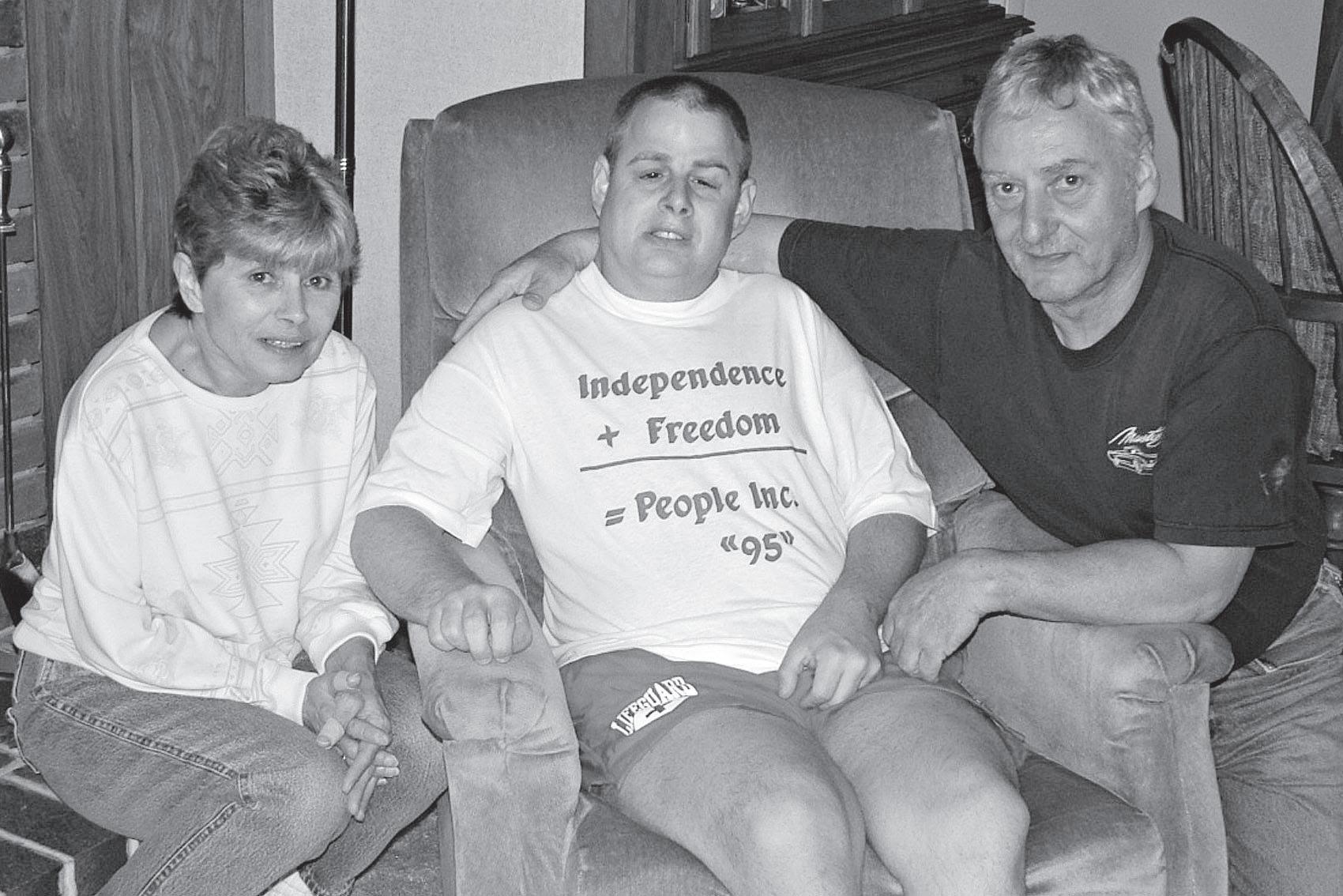
Have a crack, no matter who you are
Special gifts, special projects part of church ministry with disabled
■ By Catholic News Service
WASHINGTON (CNS) - At the altar and on the stage, Catholics with disabilities are continuing to make unique contributions to church and society.
And in response, Catholic individuals and organisations are offering special opportunities to those with physical or developmental disabilities and their families.
Bobby Couture, a 36-year-old with a form of autism and some mental disabilities, said being an altar server at the vigil Mass every Saturday at St Dominic Parish in Swansea, Massachusetts, is one of his favourite things to do.
Before he became an altar server five years ago, “I saw the boys up there and I really wanted to do it too,” Couture said. “I wanted to help Father Joe.”
Fr Joseph F. Viveiros, pastor of St Dominic, encouraged Couture, who made his first Communion years ago, to receive confirmation before becoming an altar server and is always careful to brief the altar server about any changes in Mass protocol, said Couture’s mother, Eileen.
A special part of Bobby Couture’s service is that his many friends in the parish - disabled and not - see him “exercising his right to witness to the faith,” Fr Viveiros told The Anchor, newspaper of the Diocese of Fall River, Massachusetts.
In Philadelphia, 32-year-old Christine Rouse, a Catholic born with cerebral palsy, is helping to
“They want to feel a sense of accomplishment, to see the benefits of their work and to feel good about what they are doing.”
provide an opportunity for the creative and artistic expression of teenagers and young adults with physical disabilities through the Acting Without Boundaries program she founded in 2004.
“I believe that there are no boundaries in the world of acting, regardless of one’s disability,” said Rouse, a member of St John Neumann Parish in Bryn Mawr, Pennsylvania, who has had extensive training in acting from the National Theatre Workshop for the Handicapped.
The actors who participate in Acting Without Boundaries are no different from their peers without physical disabilities, said Rouse.
“I love to act, and I think it’s good for everyone’s self-esteem,” she said in an interview with The Catholic Standard & Times, the Philadelphia archdiocesan newspaper. “You can be whatever you want to be when you’re on stage. And for my actors, it’s making dreams come true.”
Deacon George Forshay and his wife, Mary, who are members of St Anthony Parish in Hawthorne, New Jersey, make another kind of dream come true for children with autism and multiple disabilities by inviting them to their summer home at the beach.
“For many of these students, it is their first experience of the shore,” said Geraldine Gibbia, cofounder and executive director of the Phoenix Centre in Nutley, New
Jersey. “Some of them have never seen the ocean before,” she told The Beacon, newspaper of the Diocese of Paterson, New Jersey.
“To see their eyes when they spy a wave for the first time, or catch their first crab or feel the ... breeze on their faces as they zoom in the boat with ‘Captain George,’ as they call him, this is surely seeing the face of God,” she added.
For the past two years, the Forshays and 10 to 12 students and staff members have taken a road trip to Manasquan Beach every Wednesday in July. “Captain George” takes the children for a ride in his speedboat, teaches them to crab and, with his wife, sets up a tent city on the beach.
Mary Forshay prepares a barbecue with hot dogs, hamburgers, chips, watermelon, lemonade and her “very special castle cake,” said Gibbia. Other programs aim to meet the needs of disabled adults by providing work opportunities that will help them function better in the world.
We Grow Dreams Greenhouse and Garden Centre in West Chicago, Illinois, provides employment experience for people 14 and older with mental or physical disabilities, including cerebral palsy, autism and Down syndrome.
The project recently received a $13,246 grant from the Catholic Campaign for Human Development
in the Diocese of Joliet, Illinois.
Donna Jarmusz, a member of St Margaret Mary Parish in Naperville, Illinois, said her own Catholic faith “and my faith in people (have) been strengthened by this experience”.
Through the program, individuals with special needs - called “team members” - acquire job skills while pruning, watering and planting at the five-acre We Grow Dreams complex.
“People with disabilities have the same desires as everybody else,” said Jarmusz, whose 23-year-old son, Justin, has epilepsy and learning disabilities.
“They want to feel a sense of accomplishment, to see the benefits of their work and to feel good about what they are doing. But they may need a little assistance along the way to get there,” she told The Catholic Explorer, the Joliet diocesan newspaper.
Debra Dobrez, executive director of the fledging Wishing Well organisation in Manhattan, Illinois, also in the Joliet Diocese, hopes to build a greenhouse as part of her adult day-care facility designed to train adults with mental disabilities to function practically in the world.
“We want them to experience what it’s like to nurture something from beginning to end, and see what it becomes,” she said.
Dobrez, a member of St Joseph Parish in Manhattan, got the idea for the organisation three years ago
when her daughter Megan, now 24, was about to graduate from the special education program at a local high school. Megan Dobrez has Angelman syndrome, a genetic disease characterised by a loping gait, excessive smiling or laughing and developmental delays akin to Down syndrome.
Debra Dobrez said she hoped people with all manner of disabilities would come to see Wishing Well as a peaceful haven. “Everyone needs a place where they can feel comfortable,” she said.
A desire to make all Catholics comfortable at Mass is what led staff members at the Church of the Nativity in Midland Park, New Jersey, in the Newark Archdiocese to begin monthly Sunday Masses for the “differently-abled,” mostly youngsters and young adults with Down syndrome or autism. Through the parish’s Giving Religious Education With Alternative Teaching, or GREAT, program, Janet Nemec, director of lay ministries, found that many families “were not comfortable attending Sunday Mass due to the behaviour of their children.”
Father John O’Connell, pastor, told The Catholic Advocate, the archdiocesan newspaper, that he tailors his homilies to the children, telling them that the Church is God’s house, where they can be comfortable and “be who they are”. The priest sees the Masses as “the perfect opportunity to reach out to God’s children and satisfy their (spiritual) needs”. “I get more out of it than they do,” he confessed.
Contributing to this roundup were Dave Jolivet in Swansea, Christie L. Chicoine in Philadelphia, Cecile San Agustin in Hawthorne, Paul Storer in West Chicago, Jacqueline Pinn in Manhattan and Ward Miele in Midland Park.
October 19 2006, The Record Page 13
Go for it: Thirty-six-year-old Bobby Couture, centre, has been an altar server at St. Dominic’s Parish in Swansea for more than five years. He has a form of autism; serving Mass is one of his favourite activities.
Movies
Wringing a continent dry to put a ring on her finger
■ By Martyn Drakard
Diamonds may be a Western girl’s best friend, but they bring untold misery to Africa.
Pirates and their loot have captured the imagination of many generations of schoolboys.
In the world’s last great unexplored quarry, Africa, pirates and loot are part of life, as harsh as the desert landscape.
From the search for diamonds in King Solomon’s Mines to the heartless plunder of Congolese ivory in Heart of Darkness to the present day, Africa has been a helpless target for plunder.
Ghana used to be called the Gold Coast and Cote d’Ivoire says everything. It still is.
Blood Diamond, a Warner Brothers movie to be released in December, will bring the topic to a wider public. Set in the late 1990s when rebel militias seized control of Sierra Leone’s diamond mines and sold rough gems to buy weapons to slaughter and mutilate thousands of innocent people, the film aims to create awareness of the conflict diamond trade.
The film depicts a diamond cartel that buys conflict gems from rebels and mercenaries and stockpiles them in their European vaults to stop them flooding the diamond market.
A dozen child amputees appear in the film, real victims of diamond wars. It also focuses on other casualties of the gem wars: millions of refugees and thousands of child soldiers. There are 200,000 of these soldiers in Africa: young boys abducted from their families and trained to kill and to committ atrocities.
The diamond industry has responded with a multi-million dollar campaign to educate consumers about the Kimberley Process (a private entity run by US diamond trade groups that issues rough diamond certificates and is responsible for controlling the US trade of rough diamonds).
The campaign, admitted a member of the World Diamond Council, “was designed to educate consum-

ers about a story we should have told years ago”. Seeing the damage diamond sales have done in human terms over many years and in many places, this is an understatement.
The diamond industry has a bad name in Africa for funding rebel activities and civil wars, for purchasing arms and for money-laundering. A report to the UN Security Council in September this year revealed that large stocks of conflict diamonds from the rebel-controlled area of Cote d’Ivoire were infiltrating the legal diamond trade.
They are smuggled into Ghana, bypassing Kimberley Process procedures. Also in September Botswana entered the diamonds scene: Kalahari Bushmen were evicted by the government from their land where De Beers is exploring for diamonds. Through their advocates they appealed to Leonardo di Caprio, the star of Blood Diamond, asking for help.
Diamonds are only one large chapter. Oil and gold are others.
The involvement of world powers in Sudan’s oil is becoming better publicised in the world media. In the last year China, the world’s second-largest consumer of oil, has
moved into the petroleum sector in Gabon, Angola, Algeria and Egypt.
It already has a large stake in Sudan, and beat a Swedish and a Spanish company for prospecting rights in Kenya.
The China National Offshore Oil Company Ltd (CNOOC) has been awarded six out of eleven blocks, including the two best. Last year CNOOC purchased a stake in Nigeria’s OML Block 130 for $3.04 billion, making China one of the top direct investment providers in Africa. China already exports oil from Angola and Congo Brazzaville. Neighbouring Uganda has already struck oil reserves in commercial quantities and by 2012 it expects to export 40,000 barrels per day. SubSaharan African has become one of the fastest-growing oil arenas in the world.
Chinese activity in Sudan is worrying. The European Coalition on Oil in Sudan (ECOS) and other human rights groups accuse the Chinese of colluding with the Khartoum government in financing the war against the rebels in Darfur.
Sudan exports 300,000 barrels per day of crude oil, and petroleum
and its derivatives have been leading export items for several years.
In Block 6 - mainly Darfur40,000 barrels are produced per day. Oil has been discovered on the North-South (of Sudan) divide which passes through Darfur. If the South votes to secede after five years, the area will have been devastated by the government’s scorched earth policy.
Khartoum has also been buying arms from China: gun-ships, planes, military trucks, small firearms and ammunition. China has a policy of non-intervention in conflict resolution and prevention in Africa. It has never condemned Khartoum for the atrocities in Darfur, nor does it support US sanctions imposed on the Bashir regime.
Oil wealth is dangerous enough, but under the hard ground of Dafur may lie gold and diamonds as well. The west and south-west parts of the region have been earmarked by foreign companies and by the Sudanese government for prospecting. The conflict is spilling over into Chad too, where many civilians have been killed by the Janjaweed; Chad also has oil reserves and natural gas.
Russia also needs Africa’s oil and natural resources. Russian companies plan to invest US$5 billion in sub-Saharan Africa’s natural resources industry over the next five years.
It was Russia that largely supplied weapons for the 1998-2000 border war between Ethiopia and Eritrea, and they are still selling weapons to both countries. Eritrea may have minerals and energy, and Russia wants to be there first.
Africa still depends heavily on its natural resources, whereas in most of the rest of the world manufactured goods make up 80 per cent of exports. Its resource wealth attracts conflict, because of widespread poverty; and the poverty is aggravated by conflict over the resources.
It is a vicious circle. What Africans fear is that the environment will be adversely affected.
In the greedy international rush for the spoils, China, along with India, Russia and Malaysia may leave Africa a depleted disaster area.
There are signs of hope: one is the Extractive Industries Transparency Initiative. This requires oil, gas and mining companies to publicly disclose all the payments they make to governments, who in turn are supposed to publish what they receive from these companies. Some key countries such as Nigeria, Ghana and Democratic Republic of Congo have already signed up. As China’s economic development increases, will the call for democratisation and transparency grow too, as has happened elsewhere? For Africa’s sake, we hope so. Perhaps Hollywood has got it right. Blood Diamond may bring about change for the better. If so, we need many more Hollywood productions to put a spotlight on human rights abuses in Africa, especially those carried out against the most innocent and vulnerable, the children: the ones in forced labour, the victims of prostitution, pornography and trafficking, and the child soldiers in this part of Africa whose treasures outstrip the fabled splendour of Ali Baba’s cave.
Martyn Drakard is a Kenyan of British origin, a teacher for many years and now Director of the Community Outreach Programme in Strathmore University, Nairobi. He is a regular columnist on social issues for local publications.
Vatican ‘bank’ to broadcast Christianity
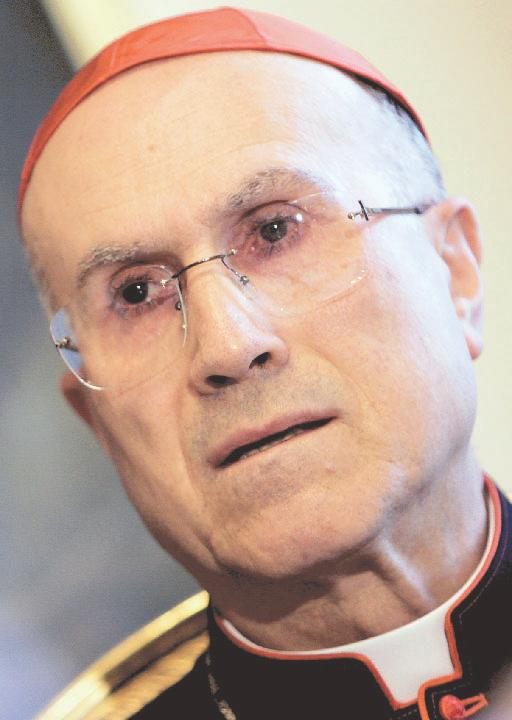
Catholic broadcasters begin new era of sharing, says Vatican official
■ By Catholic News Service
Catholic broadcasters have begun a new, “outstanding phase in the history of Catholic communications,” marking a new era of sharing and cooperation, said US Archbishop John P. Foley.
Speaking on October 12 at the close of the World Congress of Catholic Television, the head of the Pontifical Council for Social Communications said the meeting helped forge new contacts and joint projects between Catholic
broadcasters and producers around the world.
The October 10-12 congress, sponsored by the communications council, brought together some 300 people from 50 different countries to find ways station managers, program producers and journalists could promote and improve Catholic broadcasting and audiovisual productions.
In an aim to showcase and share some of the best that Catholic television has to offer, the Vatican’s communications council used the congress as a springboard to launch the first global Catholic program bank.
Production companies and television stations attending the congress were asked to contribute programs on DVD that could then be
rebroadcast or distributed totally free of charge by other companies and channels.
Archbishop Foley said that some 139 programs had been donated during the congress.
Still in its early stages, the bank is scheduled to be accessible through the Internet by the end of 2007. The Vatican council will coordinate and run the bank so that bank members can upload and download broadcast quality videos of their choice for free.
In a message dedicated to the Madrid congress, Pope Benedict XVI encouraged all church organisations that produce or broadcast television programs to reach out to each other in a climate of dialogue and cooperation.
Written by the Vatican’s secretary of state, Cardinal Tarcisio Bertone, the message underlined the powerful effect television can have on the world.
Because of advances made in modern communications, broadcasters and producers have an even greater opportunity “to defend the dignity of every person, to promote peace, solidarity, unity and communion with the human family,” the message said.
The Vatican published a copy of the message on October 10.
The message called on Catholics involved in audiovisual programming to find ways “to enhance professional quality so as to facilitate a more spirited dialogue between the Church and the world.”
Page 14 October 19 2006, The Record
CNS
Cardinal Tarcisio Bertone
BUILDING TRADES
■ BRICK REPOINTING
Phone Nigel 9242 2952.
■ PERROTT PAINTING PTY LTD
For all your residential, commercial painting requirements. Phone Tom Perrott 9444 1200.
■ PICASSO PAINTING
Top service. Phone 0419 915 836, fax 9345 0505.
FURNITURE REMOVAL
■ ALL AREAS
Mike Murphy 0416 226 434.
SERVICES
■ REPAIR YOUR LITURGICAL BOOKS
Tydewi Binderie offers a reliable binding & repair service for books, Bibles, Missals, Lectionaries. Visit our website at: http://our.homewithgod.com/ benedict/ or Ph 0435035438
ACCOMMODATION
■ FAMILY/GROUP ACCOMMODATION Luxury f/f beach house complex Perth. www.guadalupehill.com. 0400 292 100.
ACCOMMODATION
■ DENMARK
Holiday House 3bdr x 2bath, sleeps up to 8. BOOK
NOW. Ph: Maria 0412 083 377.
PRAYER
■ PRAYER TO ST JUDE
Thankyou God for answering my prayers, thank you St Jude for interceding on my behalf. I will encourage devotion to you always. Suzanne Hebiton.
OFFICIAL DIARY BISHOP SPROXTON
21 Opening of Day of Formation for Catholic Social Justice Council, Catholic Pastoral Centre - Bishop Sproxton
21 Italian Australian Apprentice of the Year Award - Fr Tiziano Martellozzo CS
22 Catholic Doctors’ Association Annual Mass and AGM, NDA Chapel - Bishop Sproxton
Saturday October 21
RELIGIOUS PRODUCTS
■ CATHOLICS CORNER
Retailer of Catholic products specialising in gifts, cards and apparel for baptism, communion and confirmation. Ph: 9456 1777. Shop 12, 64-66 Bannister Road, Canning Vale. Open Mon-Sat.
Classifieds
Classifieds must be submitted by fax, email or post no later than 12pm Tuesday. For more information contact 9227 7778.
Mass celebrating 70th anniversary of Holy Rosary Parish, Nedlands - Bishop Quinn
24 MacKillop Rural Network Meeting - Bishop Sproxton
25 Catholic Mission Mass, Bateman - Bishop Sproxton Liturgical Launch for Archbishop’s Christmas Appeal, Catholic Pastoral Centre - Bishop Sproxton
PANORAMA a roundup of events in the archdiocese
ST. PEREGRINE MASS & ANOINTING OF THE SICK
12 noon at St Denis Parish (corner of Osborne & Roberts) Joondanna will have a special Mass in honour of St Peregrine, the patron saint of those living with cancer. We will celebrate the Sacrament of the Anointing of the Sick during this liturgy. All are welcome.
Sunday October 22
CATHOLIC DOCTORS ASSOCIATION ANNUAL MASS
Holy Spirit Chapel, Notre Dame University (Cnr Mouat & Croke St) 9.30am followed by brunch. All past and present doctors, their family and friends welcome. Nurses, Medical students and Health Care Professionals also welcome. RSVP by 16/10/06 to Natalie on 9242 4066.
Tuesday October 24 NETWORKING SEMINAR
Supported by Caritas Aust, Social Justice Council, Centrecare Inc, Council for Australian Catholic Women, Knights of the Southern Cross (WA) Inc. We warmly welcome Laity, Religious and Clergy to an “Effective Networking Seminar” presented by Ron Gibson. Discover ways to be really effective in life. CPC: 40a Mary Street, Highgate. 7 – 9pm (incl supper). Cost: $5.00 / unwaged gold coin. RSVP: Fri 20th Oct 2006. 9422 7900.
Friday October 27
QUIZ NIGHT
Hosted by Right to Life Association WA Family. Perth Soccer Club, 3 Lawley Street, West Perth at 7.30pm. $10 per person. Bookings: 9221 7117.
Sunday October 29
WORLD CENTENARY OF CATHOLIC WOMEN’S LEAGUE
Members of the Catholic Women’s League of WA will be celebrating the Women’s League Centenary, founded in England by Margaret Fletcher in 1906. Mass will be celebrated at the Redemptorist Monastery, 190 Vincent Street, North Perth at 10.30am followed by a lunch at the Royal Park Hall at noon. Members, ex-members and their families are most welcome to attend. For more information contact Margaret Ph: 9328 8978 or Fay Ph: 9284 3084.
Monday October 30
COUNTRY DAY OF REFLECTION
St Patrick’s Church, York. Join us for a Day of Reflection commencing at 10am with Rosary Cenacle, followed by talks, concluding with Holy Mass at 2pm. Talks given by Fr Michael Graugham (SSC). Reconciliation available. BYO lunch & name tags. Tea/coffee provided. Enquiries: 9641 1477 or 9641 1501.
Monday October 30 to Thursday November 2
FR MICHAEL GAUGHRAN
Marian Movement of Priests. Fr Michael Gaughran SSC, (responsible for the MMP in English speaking countries) will be visiting WA, giving talks at various venues. Please check the advertisement in this issue for details. Enquiries: 0413 707 707 or 9341 8082.
October - December
CROSS ROADS COMMUNITY
Term 4 – Tuesday 17th October – 12th December 2006. Tuesdays 5.30-7.30pm Substance Abusers Support Group & 7pm Lectio Divina at Immaculate Conception Church. Wednesdays 7-9pm Family & Friends Support Groups. Fridays 9.30am-2pm Substance Abusers All Day Support Group including Healing Mass at 12.30pm.
Wednesday November 1
BOOK LAUNCH
A history of St Gertrude’s College, New Norcia cowritten by Sr Anne Carter IBVM and Sr Elizabeth Murphy RSJ will be launched at John XXIII College, Mt Claremont at 6.30pm. To attend or order the book, phone Marie on 9275 6307 or email pstrickland@eftel.net.au by October 16.
Thursday November 3
PROLIFE PROCESSION MIDLAND
The first Friday Mass, procession and Rosary vigil will commence at 9.30am with Mass celebrated at St Brigid’s Church, Midland. The Franciscan Friars of the Immaculate will lead us. All are invited to witness for the sanctity of life and pray for the conversion of hearts. Enquiries: Helen 9402 0349.
Friday November 3
TWO HEARTS DEVOTIONS
Allendale Square Chapel, St Georges Terrace, Perth. Devotion to the Sacred Heart of Jesus on the first Friday of the month. Commences with Mass at 9pm, followed by Rosaries, prayers, hymns, exposition of the Blessed Sacrament on the hour through the night till 7am Saturday morning Mass to the Immaculate Heart of Mary. Enquiries: 9409 4543.
Saturday November 4
DAY WITH MARY
St Jude’s Church. Prendiville Way, Langford. 9am to 5pm. A video on Fatima will be shown at 9am. A day of prayer and instruction based upon the messages of Fatima. Includes Sacrament of Penance, Holy Mass, Eucharistic Adoration, Sermons, Rosaries, Procession of the Blessed Sacrament and Stations of the Cross. BYO lunch. Enquiries: Franciscan Sisters of the Immaculate 9250 8286.
Saturday November 4
WITNESS FOR LIFE PROCESSION
The next first Saturday Mass, procession and Rosary vigil will be commencing with Mass at 8.30am at St Anne’s Church, Hehir Street, Belmont. We proceed prayerfully to the Rivervale Abortion Centre and conclude with Rosary, led by Fr Paul Carey SSC. Please join us to pray peacefully for the conversion of hearts. Enquiries: Helen 9402 0349.
Sunday November 5
DIVINE MERCY
An afternoon with Jesus and Mary will be held at St Joachim’s Pro-Cathedral on the corner of Shepperton Road and Harper Street in Victoria Park at 1.30pm. Program: Holy Rosary and Reconciliation, Sermon: with Fr Anthony Van Dyke on Holy Souls and All Saints followed by Divine Mercy prayers and Benediction. Enquiries: John 9457 7771 or Linda
9275 6608.
Thursday November 23
PRESENTATION SISTERS’ 50TH ANNIVERSARY
St Augustine’s School Community invites all interested parties to attend a celebration to acknowledge the service to St Augustine’s School, Rivervale. This will take place in the school grounds at 9am, followed by morning tea. For catering purposes, RSVP by 2/11/06 on 9361 6158.
TUESDAY NIGHT PRAYER MEETINGS
St Mary’s Cathedral Parish Centre, 450 Hay Street, Perth, 7pm. Come join us! Overcome the burdens in life making prayer your lifeline with Jesus. Personal healing in prayer, Rosary, meditation, Scripture, praise in song, friendship, refreshments. Be united with Our Lord and Our Lady in prayer with others. Appreciate the heritage of the Faith.
Every Sunday
BULLSBROOK SHRINE SUNDAY PILGRIMAGE PROGRAM
Shrine of Virgin of the Revelation, 36 Chittering Rd Bullsbrook. 2pm Holy Mass, exposition of the Blessed Sacrament with Holy Rosary. Reconciliation is available before every celebration. Enquiries: 9447 3292.
First Sunday of the Month
DEVOTIONS IN HONOUR OF THE DIVINE MERCY
The Santa Clara Parish Community welcomes anyone from surrounding parishes and beyond to the Santa Clara Church, corner of Coolgardie and Pollock Sts, Bentley on the 1st Sunday of each month. The afternoon commences with the 3 o’clock prayer, followed by the Divine Mercy Chaplet, Reflection and concludes with Benediction.
YOUNG CATHOLIC WOMEN’S INTERFAITH FELLOWSHIP
The Council for Australian Catholic Women (CACW) seeks to promote the participation of women in the Catholic Church in Australia. CACW is pleased to announce that the 2007 application package for the Young Catholic Women’s Interfaith Fellowship is now available. The package can be downloaded from the website: www.cacw.catholic.org.au. For further information please contact Michelle: michelleww@iinet.net.au or 9345 2555.
BLESSED SACRAMENT ADORATION
Holy Family Church, Alcock Street, Maddington. Friday 8.30 am Holy Mass followed by Blessed Sacrament Adoration till 12 noon. Every first Friday of the month, anointing of the sick during Mass. Enq. 9398 6350.
Wednesdays
SIGN LANGUAGE COURSE
Australian Sign Language (Auslan) Classes are offered free of charge at Emmanuel Centre on Wednesdays at 1pm. If this does not suit you, other arrangements can be made. Please contact Fr Paul or Barbara at Emmanuel Centre, 25 Windsor St Perth 9328 8113.
QUEEN OF APOSTLES SCHOOL
If anyone has information on Queen of Apostles School, Riverton, used to go there or knows anyone who did please do one of the following to
tell the extension group – Call 9354 1360 and ask to speak to Veronique or email your information to veronequeregnard@gmail.com.au or janellekoh@yahoo.com.au or you can put your information into the box in the office at Queen of Apostles School. Thanking you in anticipation.
ST COLUMBA’S BAYSWATER
Information is sought from past and present parishioners of St Columba’s Catholic Church (Roberts St Bayswater) for inclusion in a written history (1905 – 2007) of the parish. Photographs of Parish Priests, parishioners and events depicting the original and current Church greatly appreciated. Contact: Carolyn Kelly, St Columba’s History, PO Box 47 Bayswater 6053 WA. Telephone: 9271 1988.
LINDA’S HOUSE OF HOPE APPEAL
To enable us to continue to provide and offer support for girls wishing to leave the sex trade we need your help. We have achieved already new offfices which are now complete at the rear of the shelter and are fully functional. Donations are also required to complete the internal layout of the shelter itself. Please send donations to Linda’s House of Hope PO Box Z5640, Perth, St George’s Tce 6831. Ph: 0439 401 009. All donations over $2 are tax deductible.
NEW WEBSITE
Address for Holy Family Parish, Maddington is http://www.holycatholicfamily.org.au
ALCOHOLICS ANONYMOUS
Is alcohol costing you more than just money? Alcoholics Anonymous can help. Ring 9325 3566.
ATTENTION COUPLES
Have you or your spouse been diagnosed with a mental illness? Depression? Anxiety/Panic Attacks? etc. Could you do with some help in understanding your/their illness? Do you know how to get help when you need it? We can help you to help each other through the Unconditional Love Program. For more information contact Amanda Olsen: 0407 192 641, or email: mandyfolsen@bigpond.com.au.
AL ANON FAMILY GROUPS
If a loved one’s drinking is worrying you – please call Al Anon Family Groups for confidential information meetings etc... Phone Number 9325 7528 – 24 hrs.
Panorama entries must be in by 5pm Monday. Contributions may be faxed to 9227 7087, emailed to administration@therecord. com.au or mailed to PO box 75, Leederville, WA 6902.
Submissions over 55 words will be amended. Inclusion is limited to 4 weeks. Events charging over $10 constitute a classified event, and will be charged accordingly. The Record reserves the right to decline or modify any advertisment.
October
October 19 2006, The Record Page 15 Classifieds Classified ads: $3.30 per line incl. GST 24 hour Hotline 9227 7778 Deadline: 12pm Tuesday ADVERTISEMENTS
The Last Word
Latino passion flows


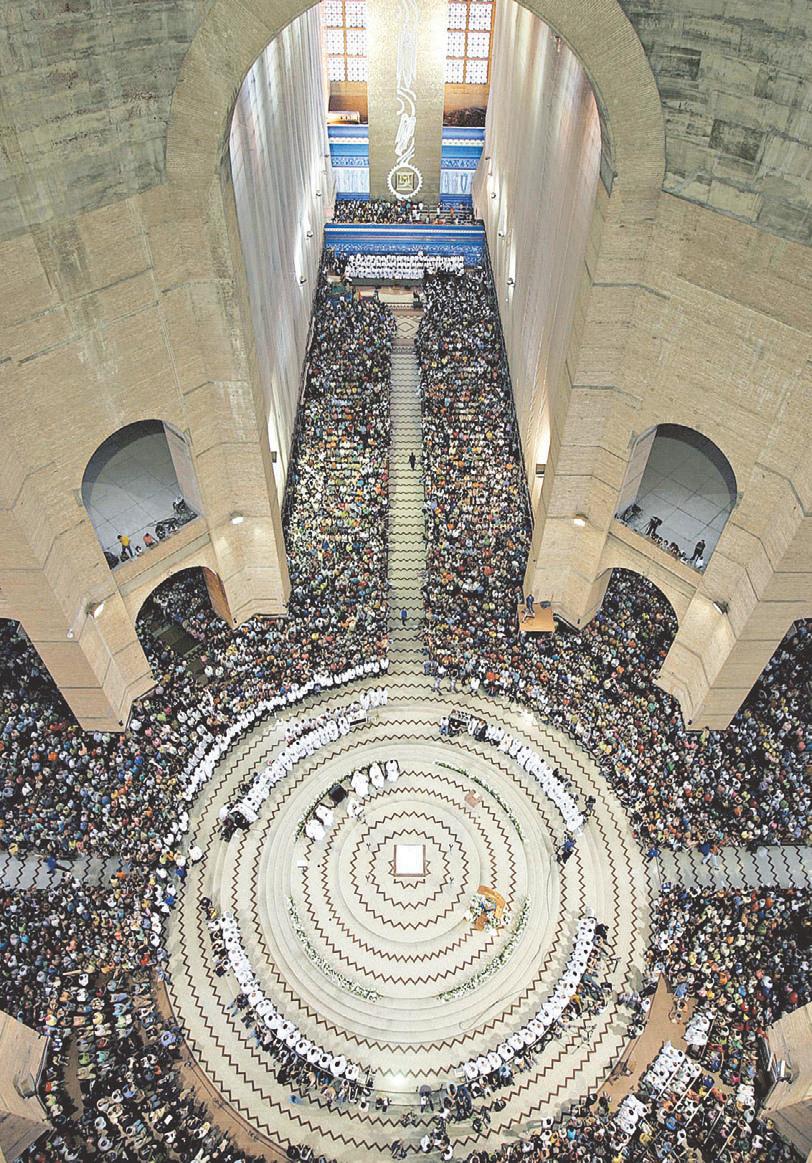
But decline prompts personal visit by Pope
■ By CNS and news services
The largest Catholic population in the world came out in force to show its true colours last week at the main annual Marian devotion in Brazil.
Over 160,000 people flooded the streets surrounding the cathedral for the pilgrimage and celebrations in Aparecida, the site where Pope Benedict XVI will help celebrate the occasion in May next year.
The Pope announced last year that he would attend the Latin American bishops’ meeting in Brazil in May 2007.
Late in 2005 Pope Benedict XVI chose the Marian sanctuary of Aparecida, Brazil, for the Fifth General Conference of Latin American Bishops in 2007, according to the website of the Latin American bishops’ council, known as CELAM.
It said the Pope communicated his decision in a meeting with Chilean Cardinal Francisco Errazuriz Ossa of Santiago, Brazilian Cardinal Claudio Hummes of Sao Paulo and Argentine Cardinal Jorge Mario Bergoglio of Buenos Aires.
There had been discussion about the possibility of holding the meeting in Rome to make it more convenient for Pope Benedict; but the Pope decided to travel to Latin America because “he understands the significance of his presence in our countries,” said Cardinal Errazuriz, the president of CELAM.
Cardinal Errazuriz added that the general conference in May 2007 will be likely to focus on the discipleship and role of Catholics in today’s world.
Brazil has the largest Catholic population in the world.
At the recent Synod of Bishops, however, Cardinal Hummes said the number of Catholics was declining by about one per cent each year, with many Catholics joining Protestant sects.
“We have to wonder: How long will Brazil be a Catholic country?”
Cardinal Hummes pondered.
CELAM held its last general conference in Santo Domingo, Dominican Republic, in 1992.
It was preceded by conferences in Puebla, Mexico, in 1979 and Medellin, Colombia, in 1968.
CELAM grew out of the first conference, held in Rio de Janeiro, Brazil, in 1955.
Page 16 October 19 2006, The Record
PHOTOS: CNS/PAULO WHITAKER/REUTERS
Standing room only: Catholics gather in the cathedral in Aparecida, Brazil on October 12, for a local Marian feast that draws over 100,000 pilgrims. It could get even bigger next year when the Pope visits.
Ray of light: Catholics pray in the cathedral in Aparecida, Brazil, during a popular local Marian feast on October 12. Pope Benedict XVI plans to attend the Fifth General Conference of Latin American Bishops at the shrine in May 2007.


























 Jim Wallace
Jim Wallace


































































